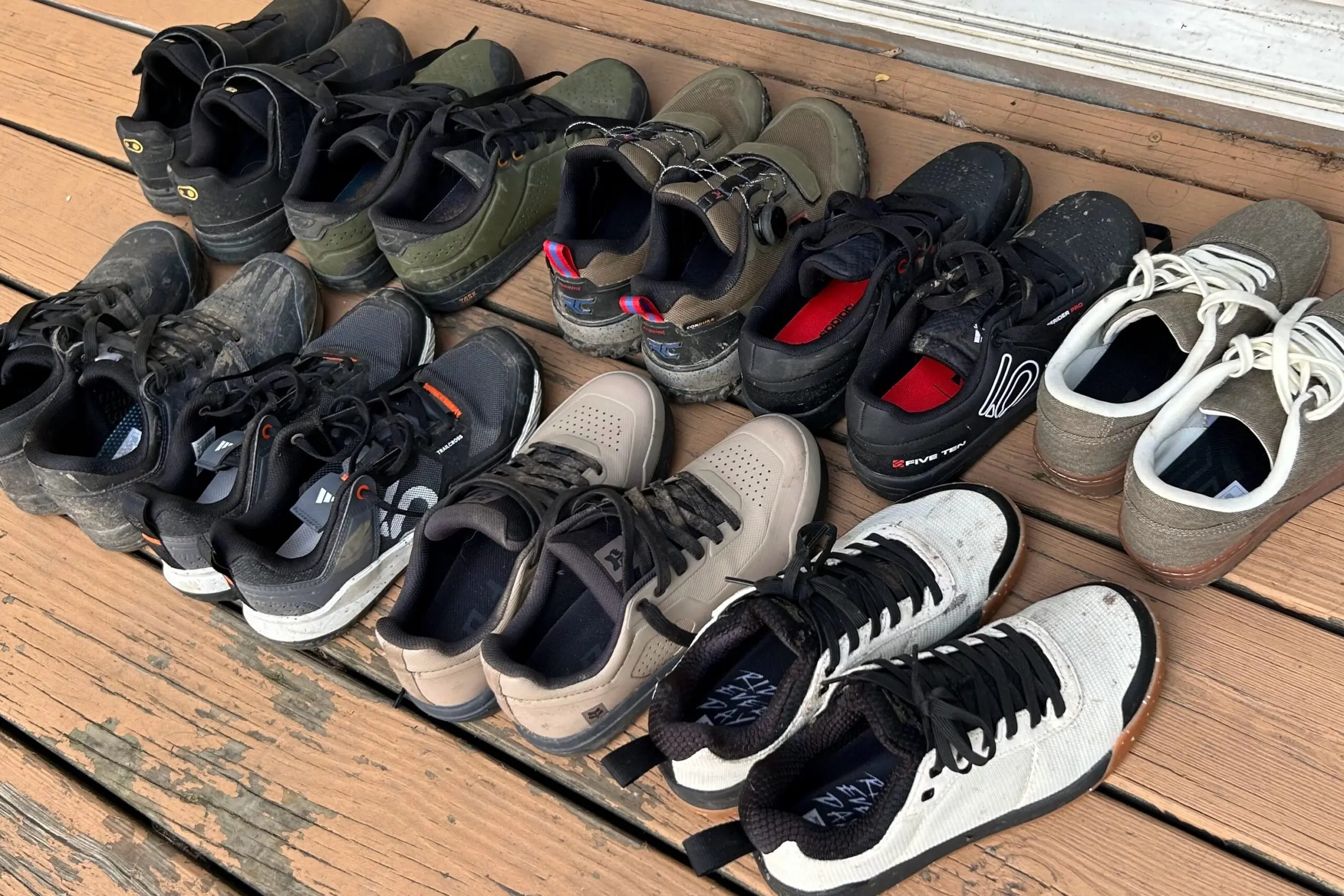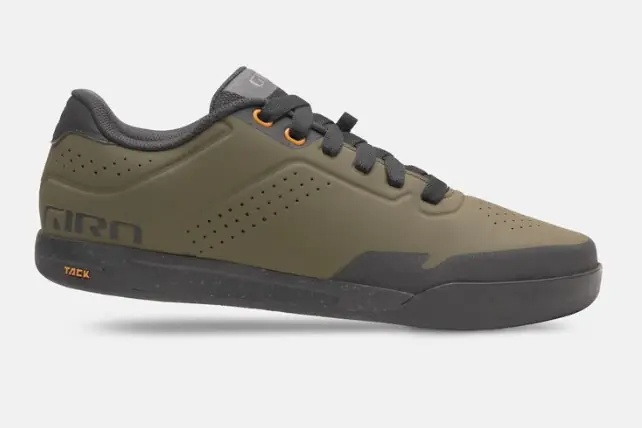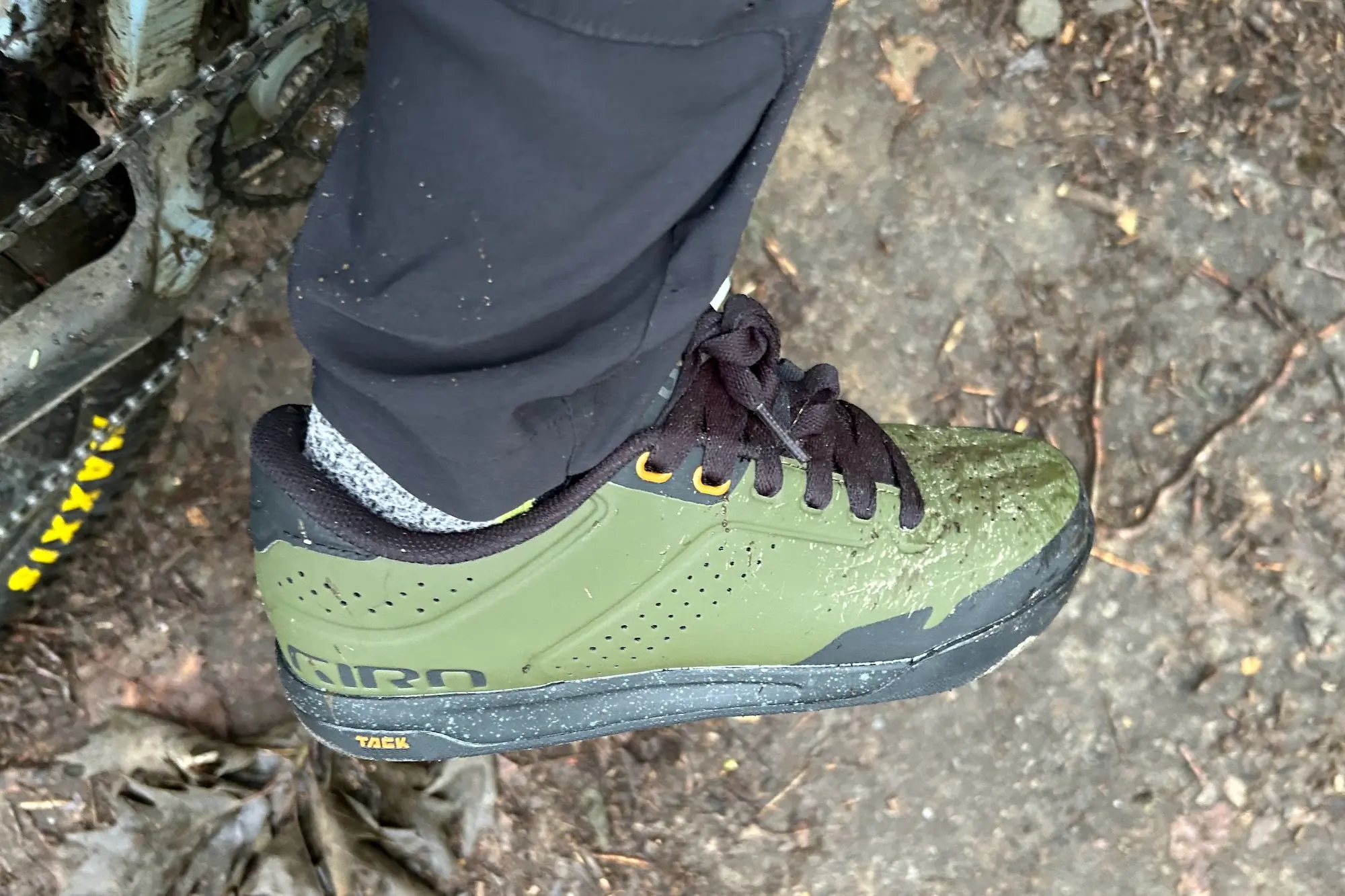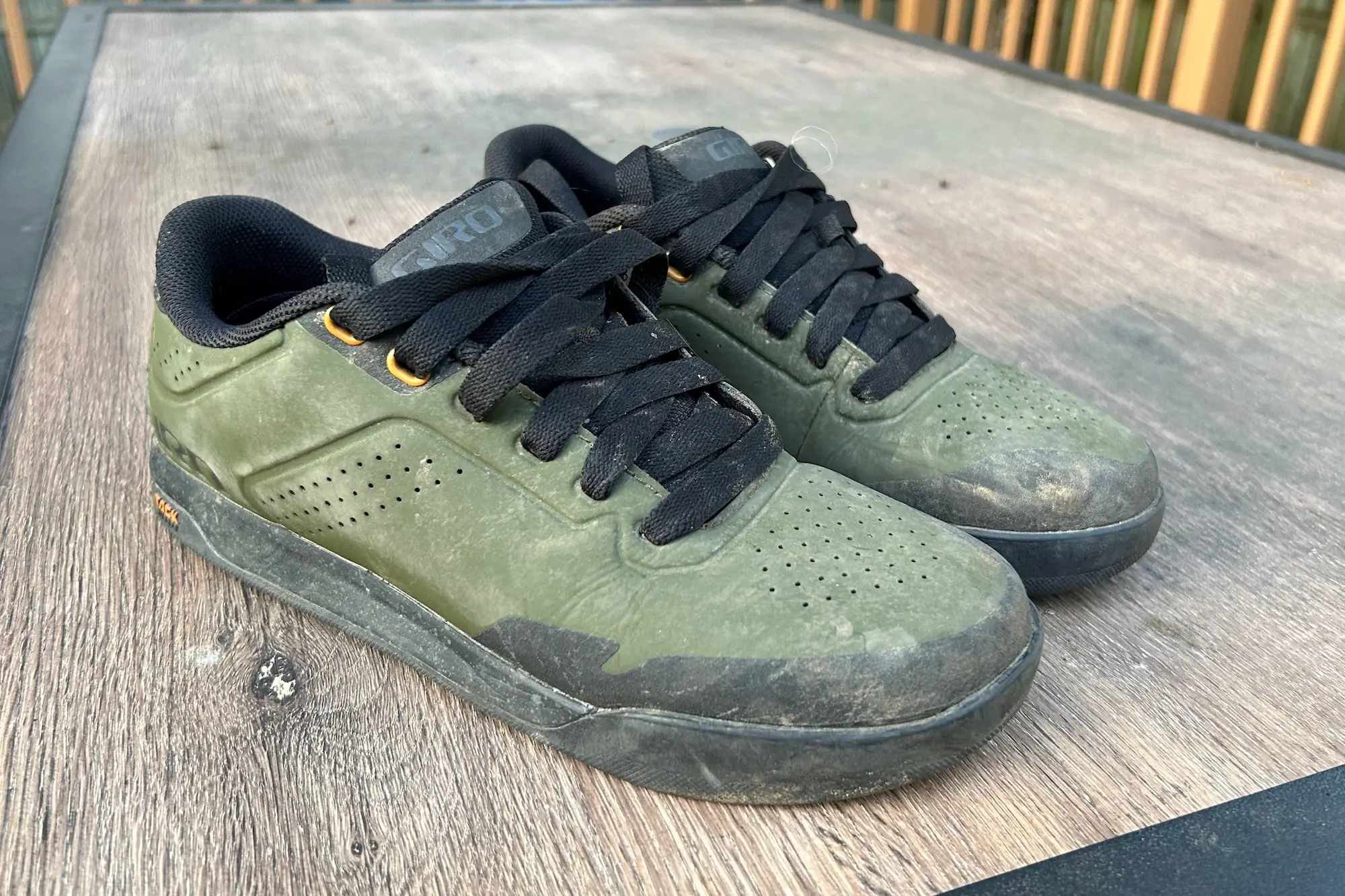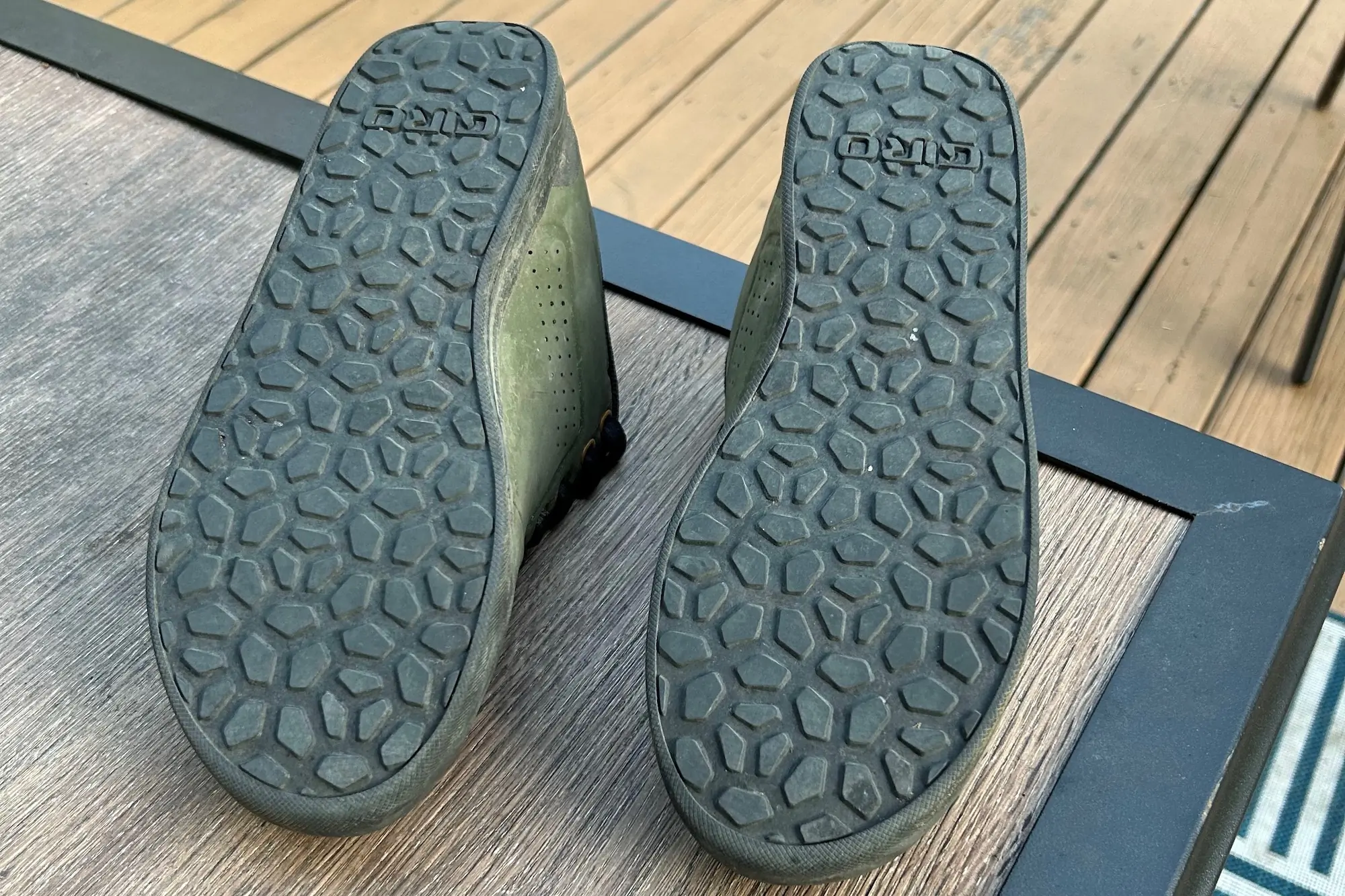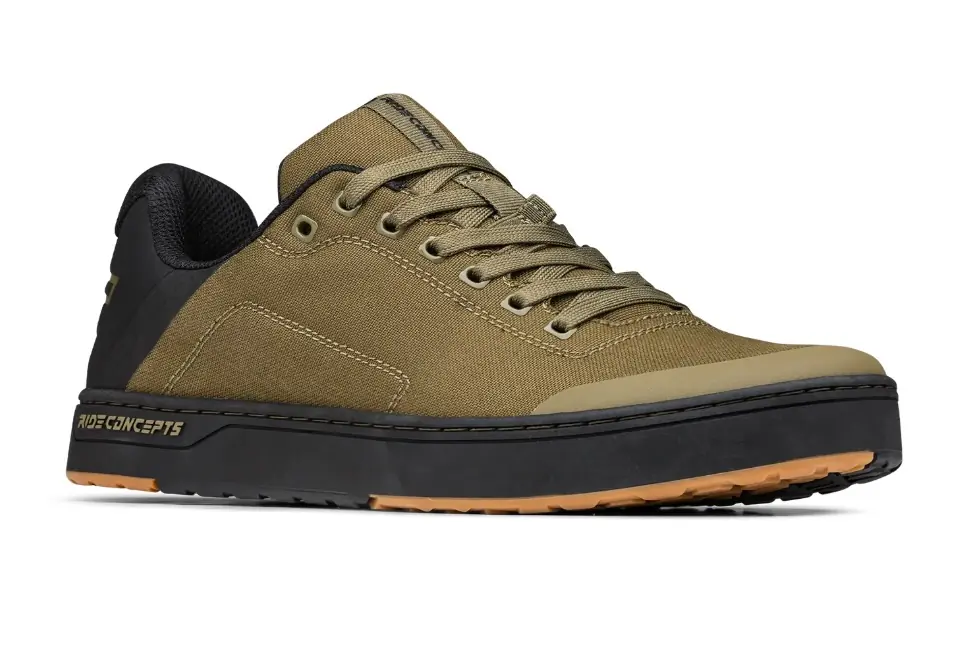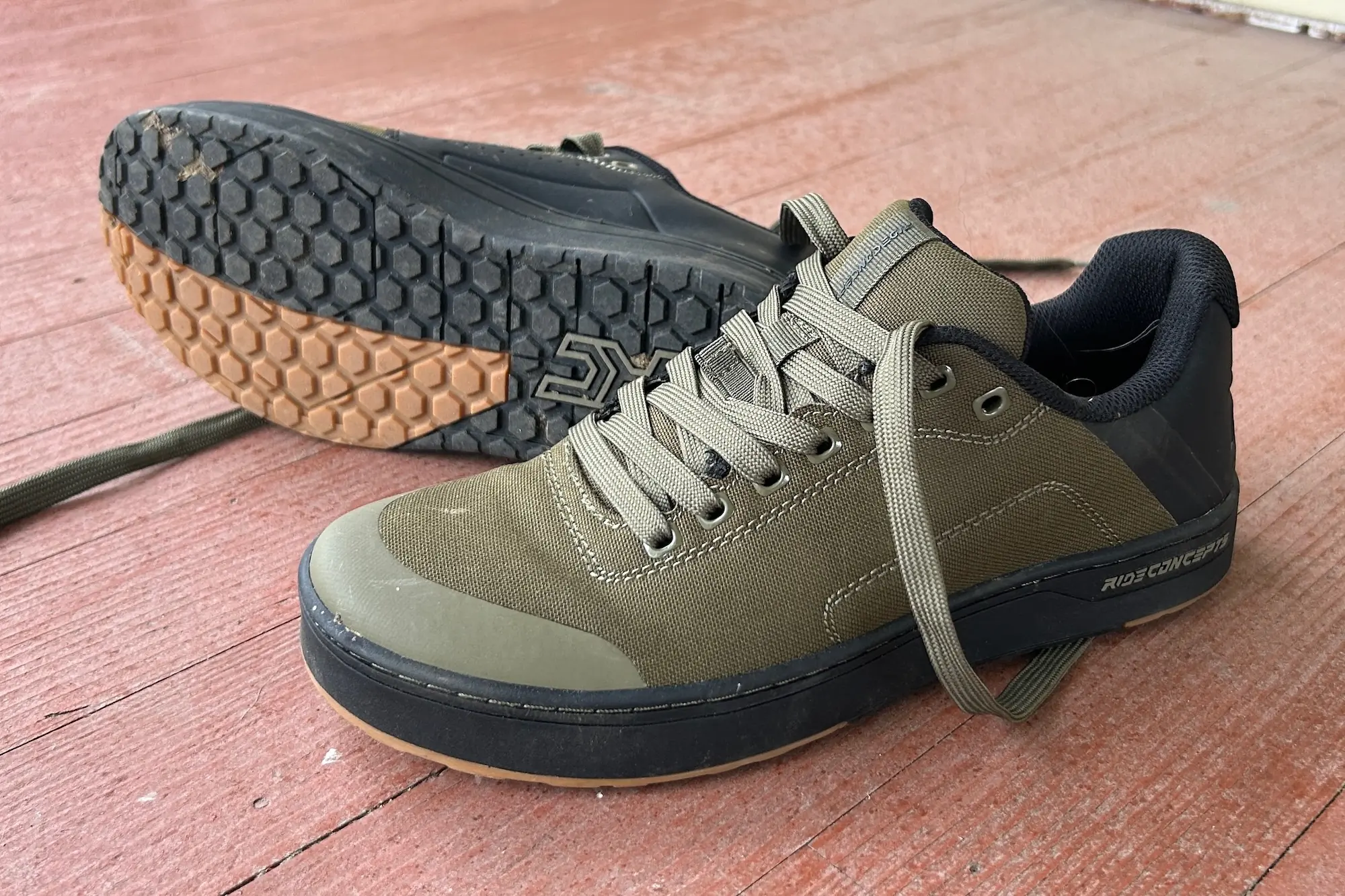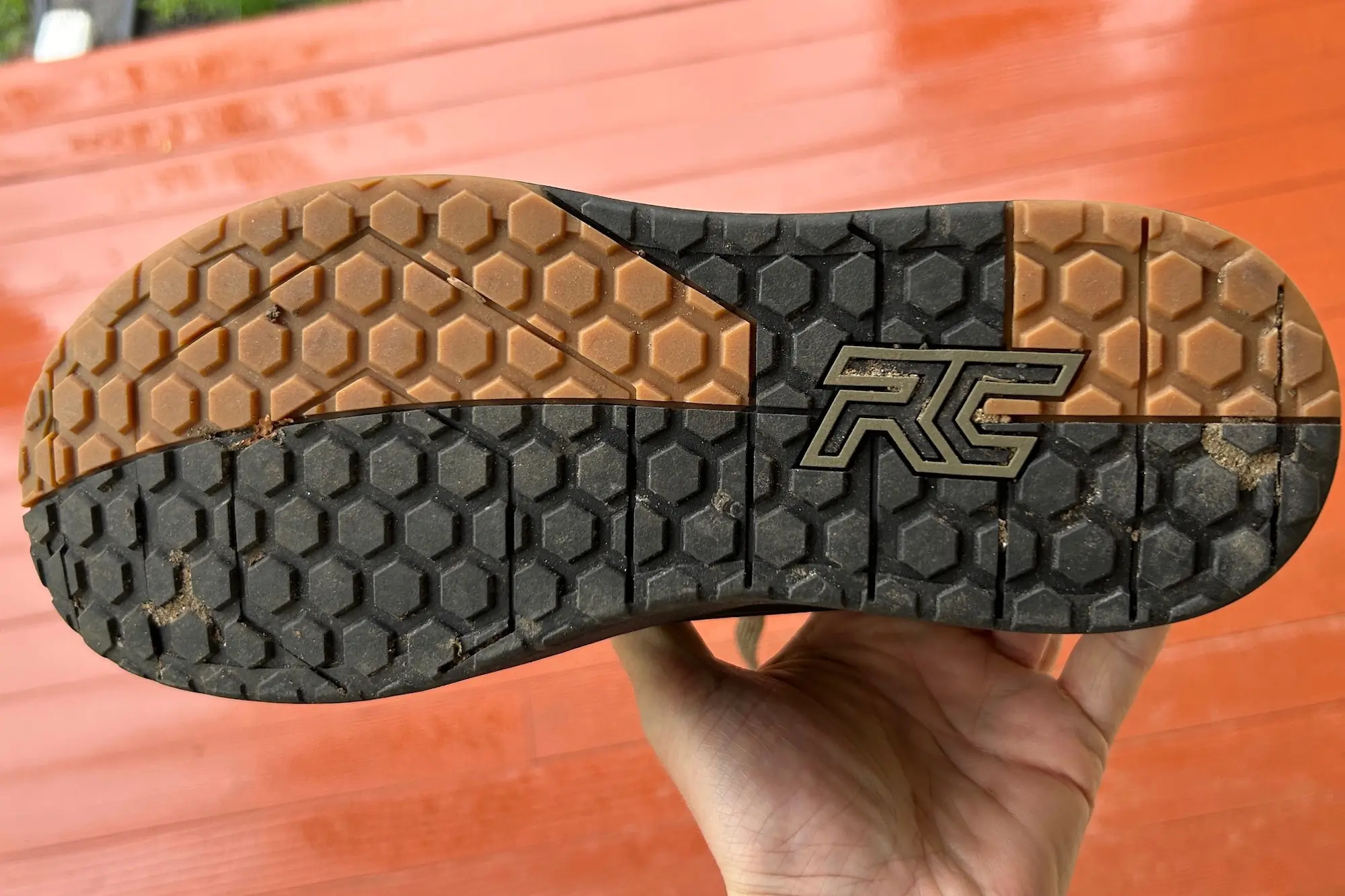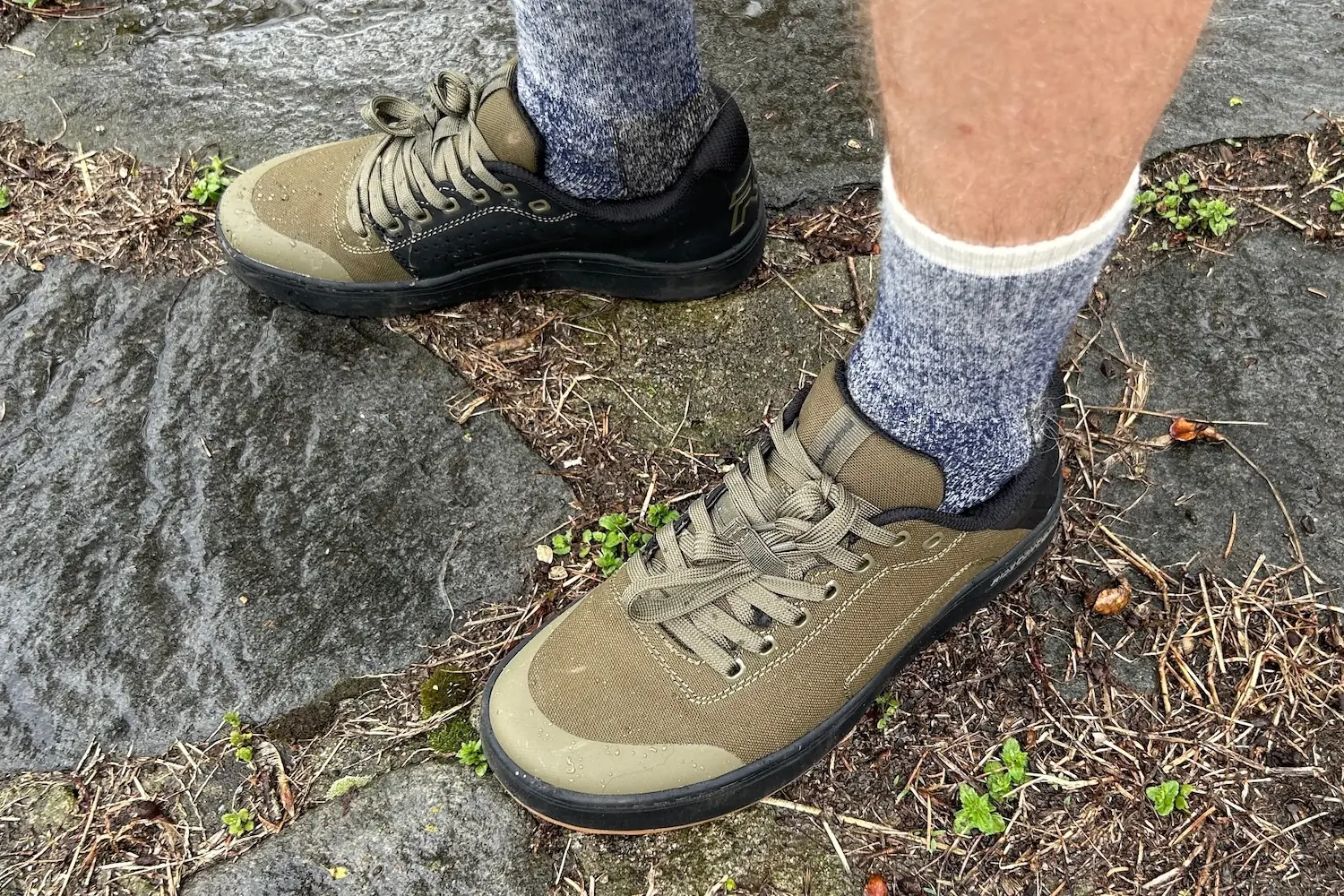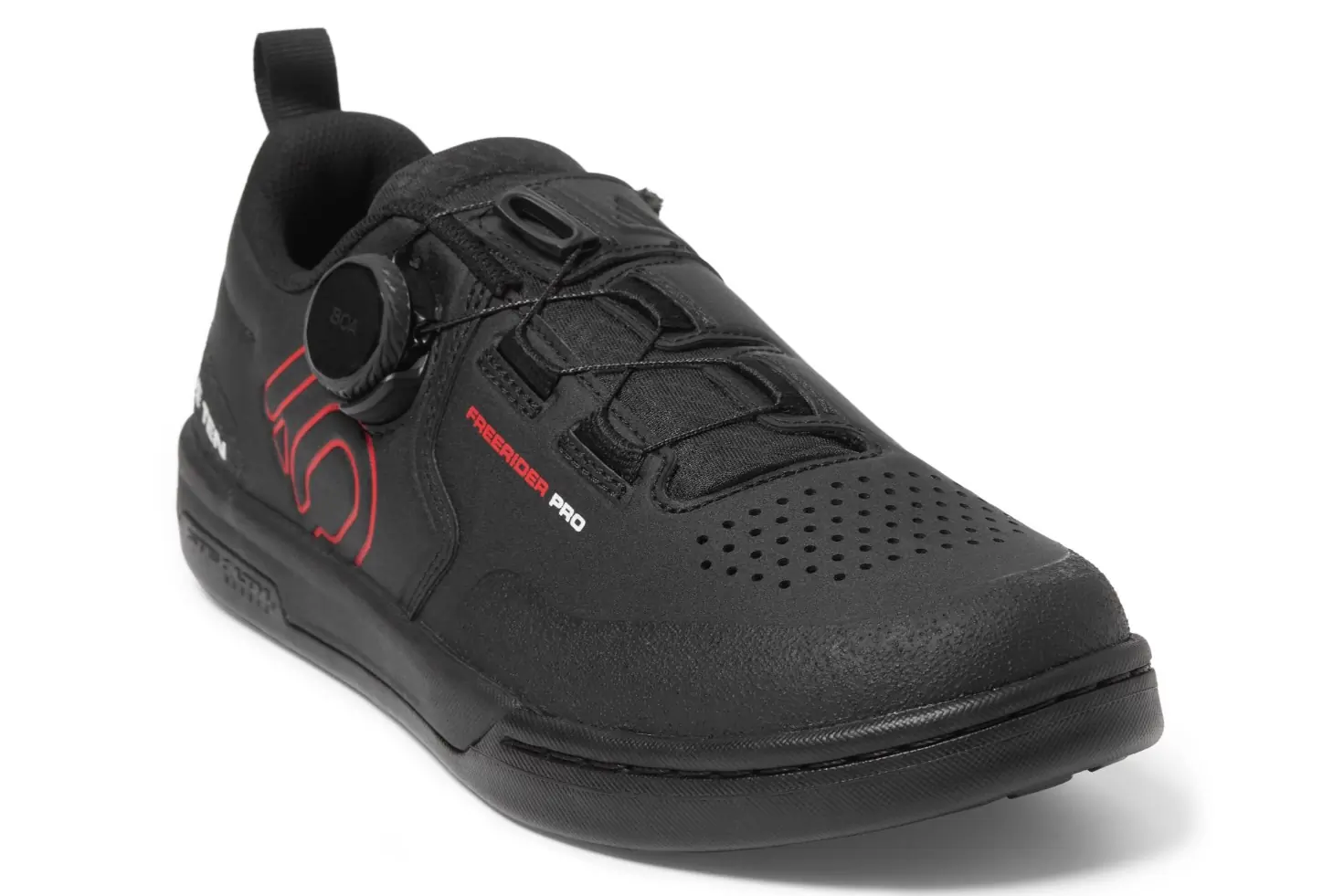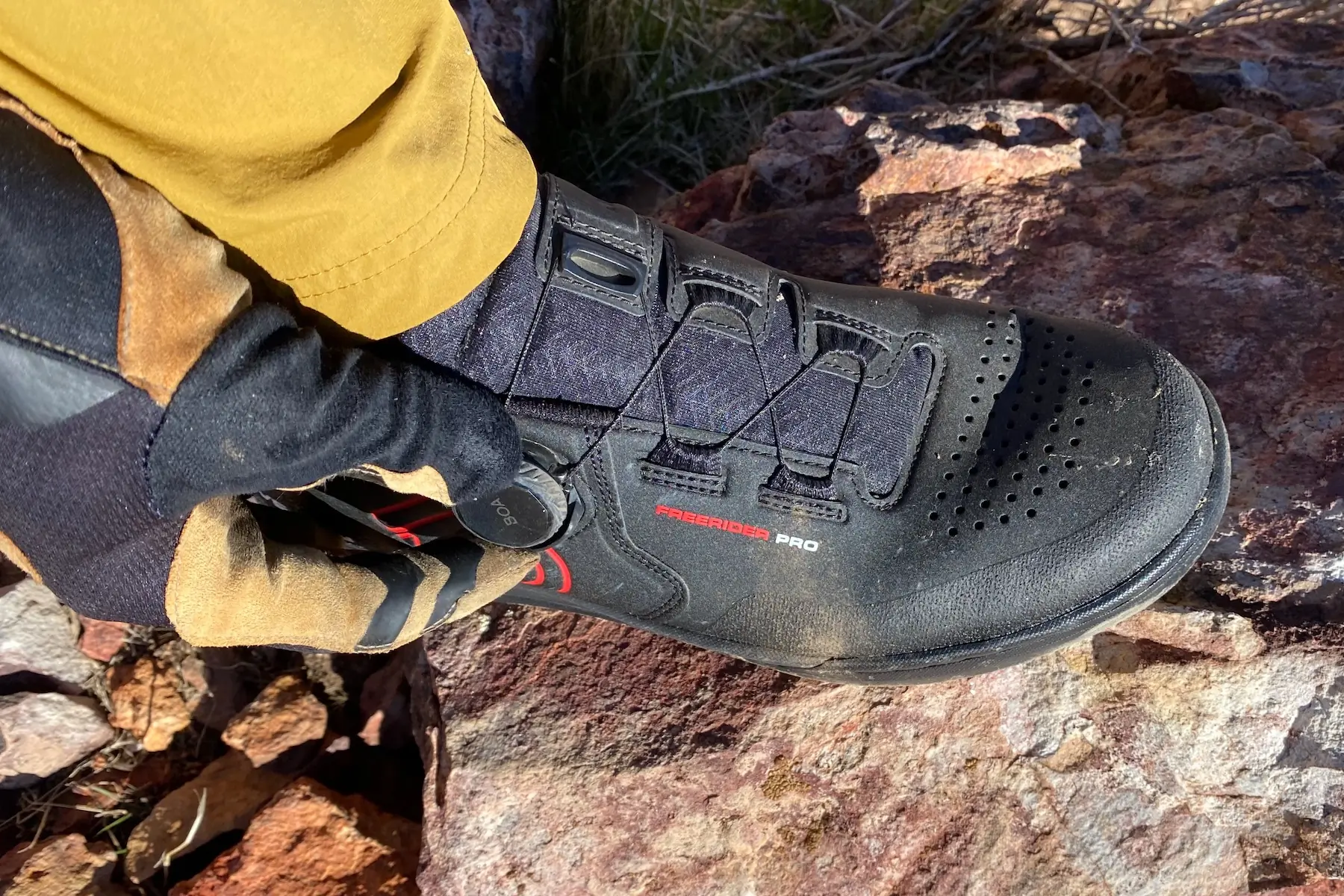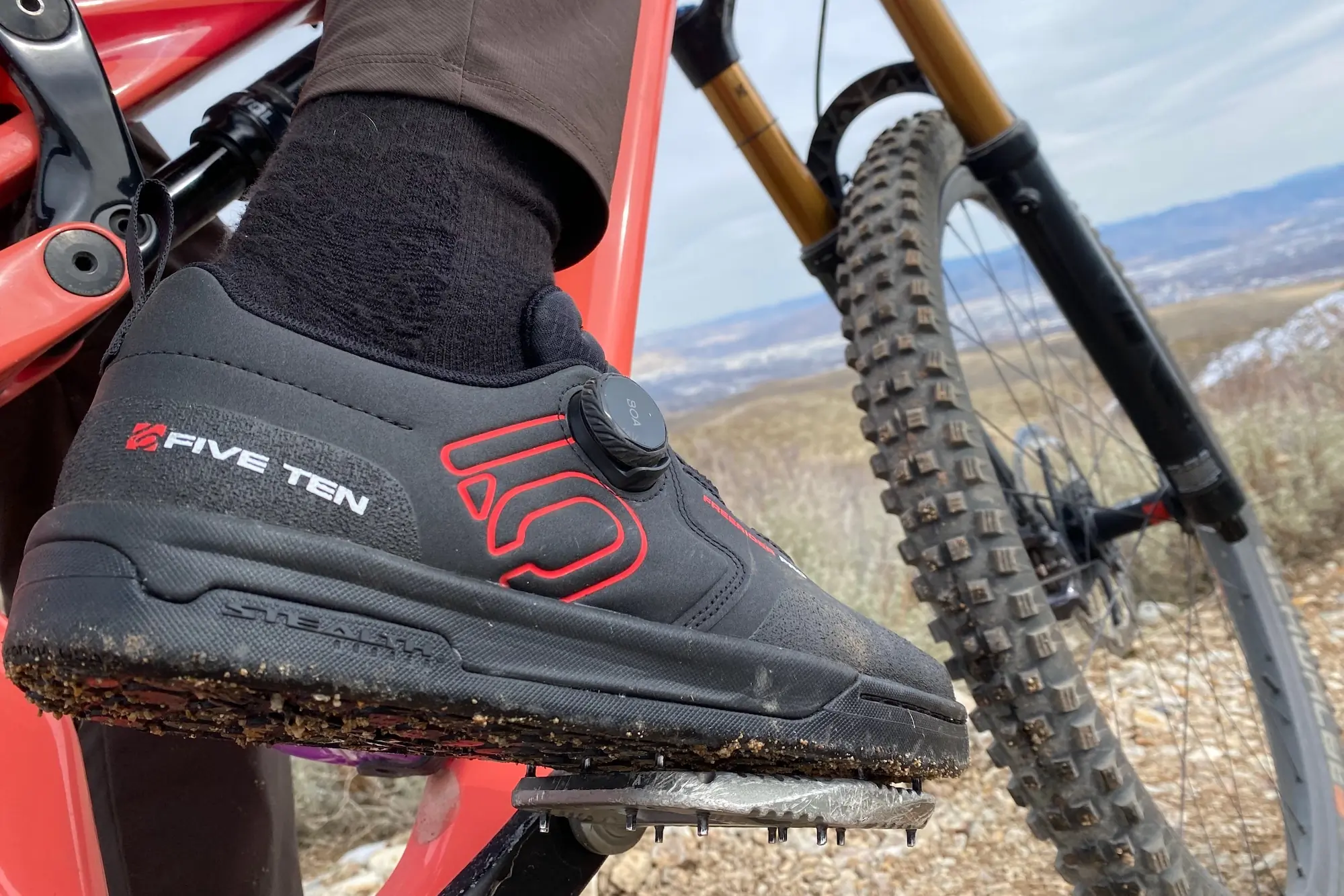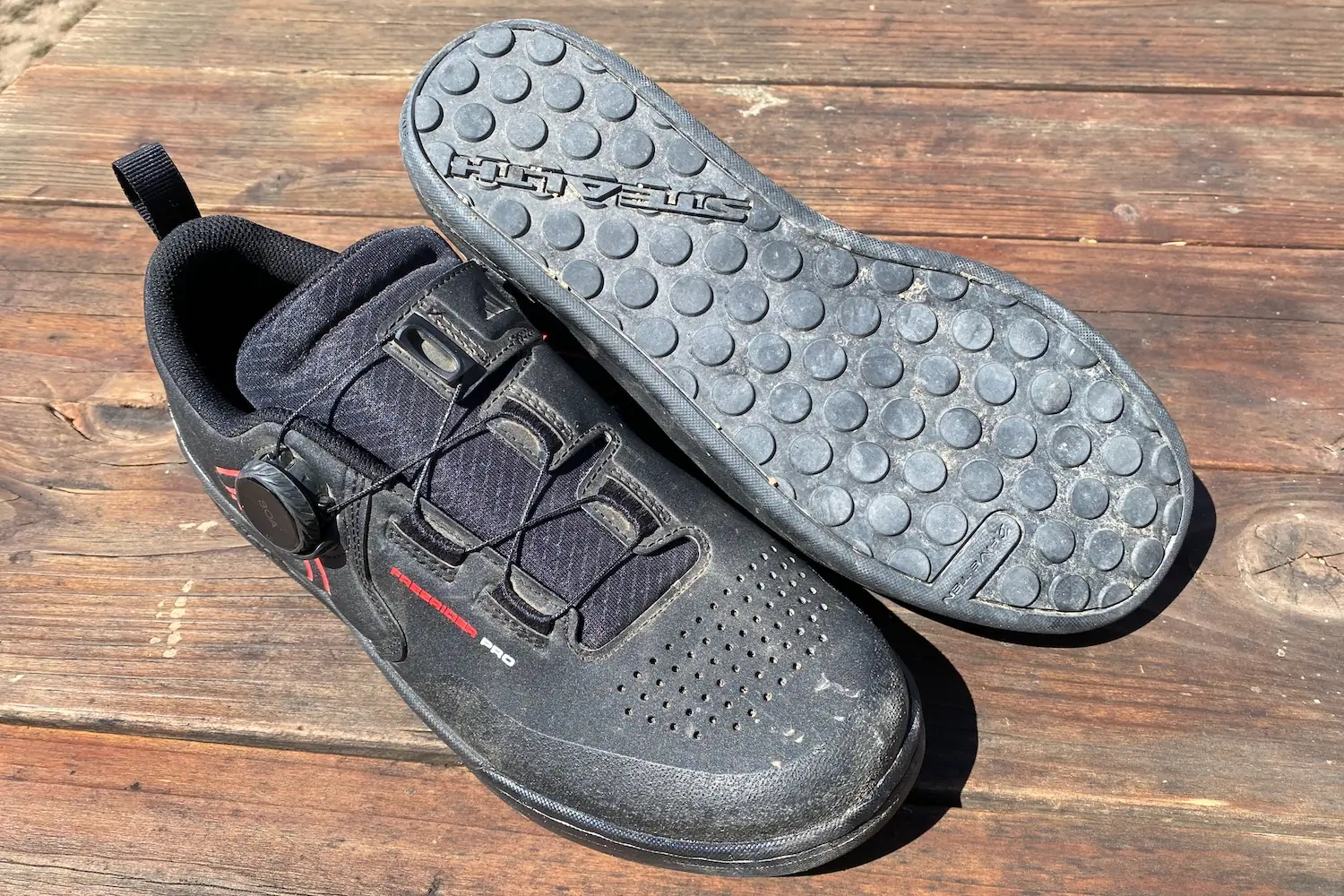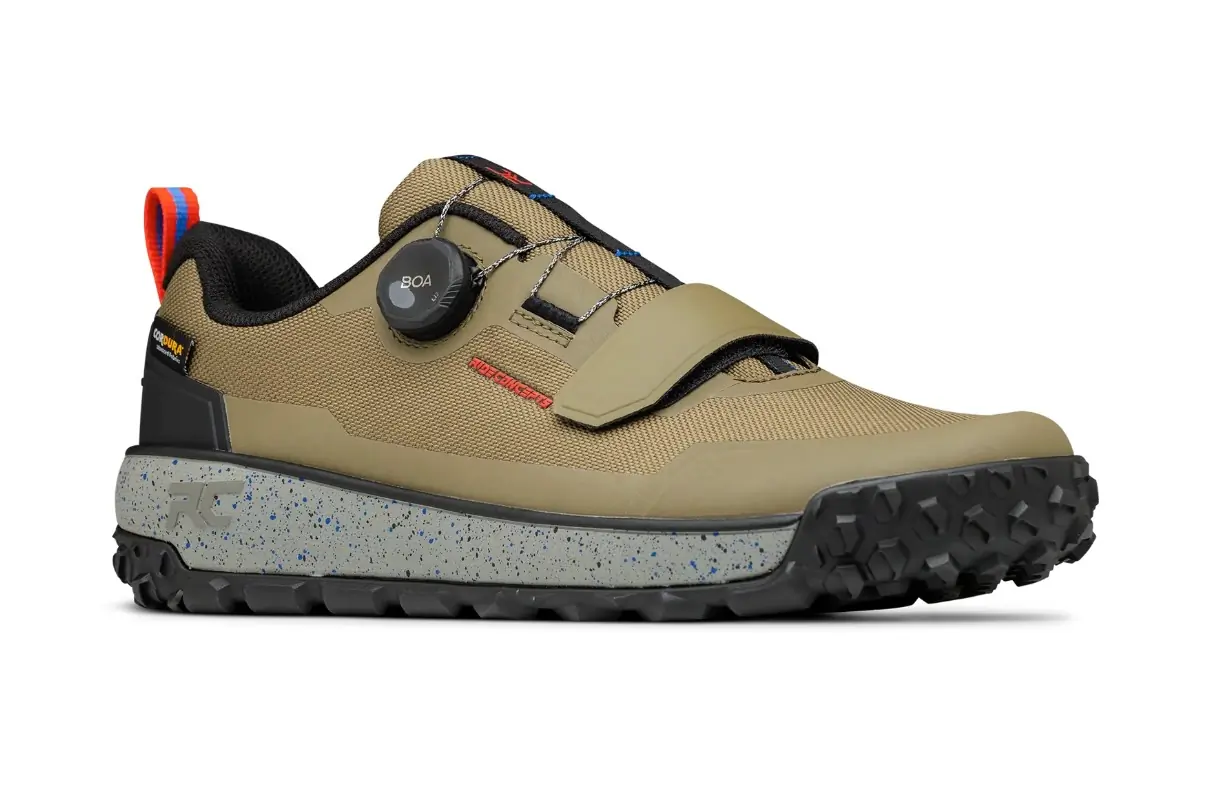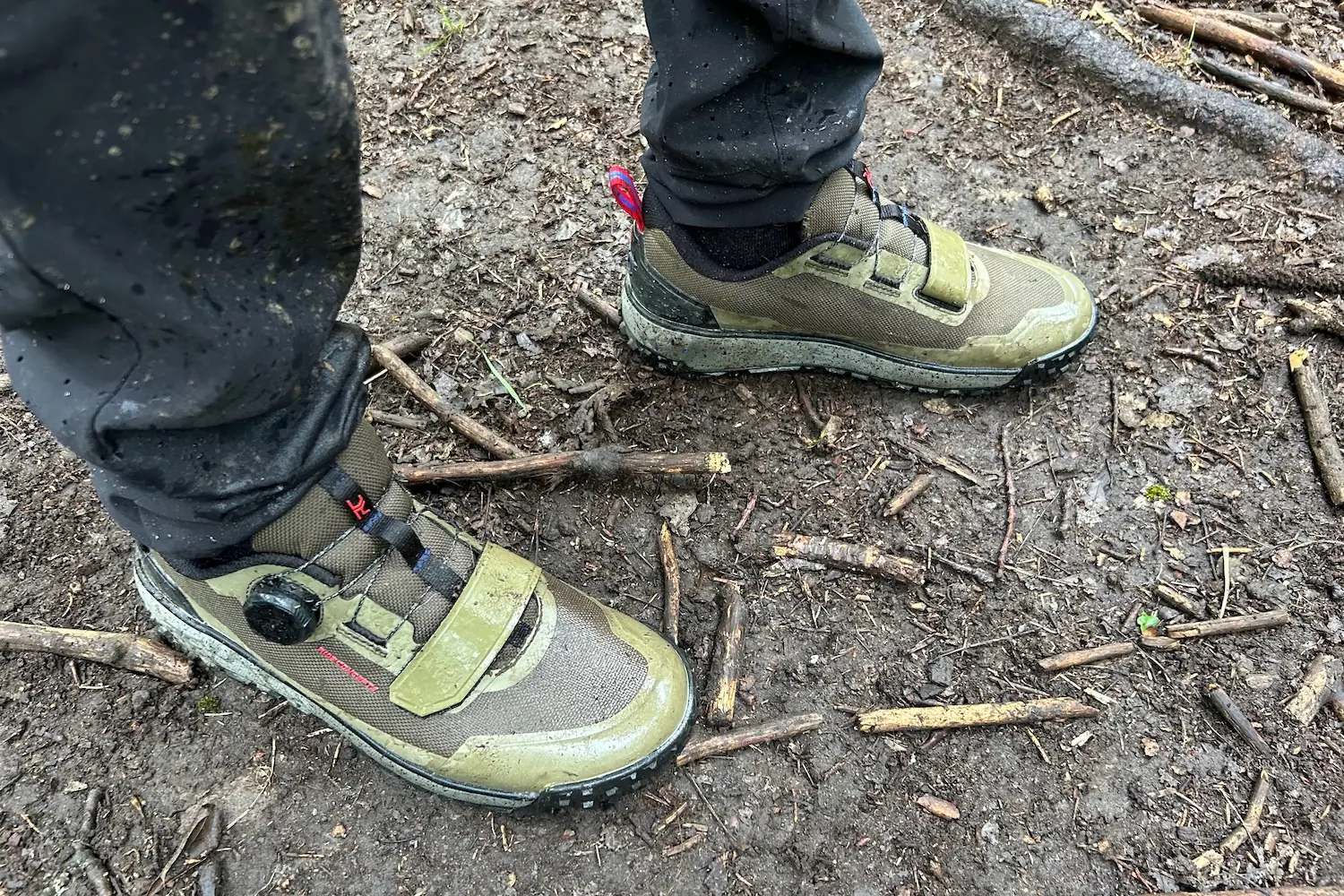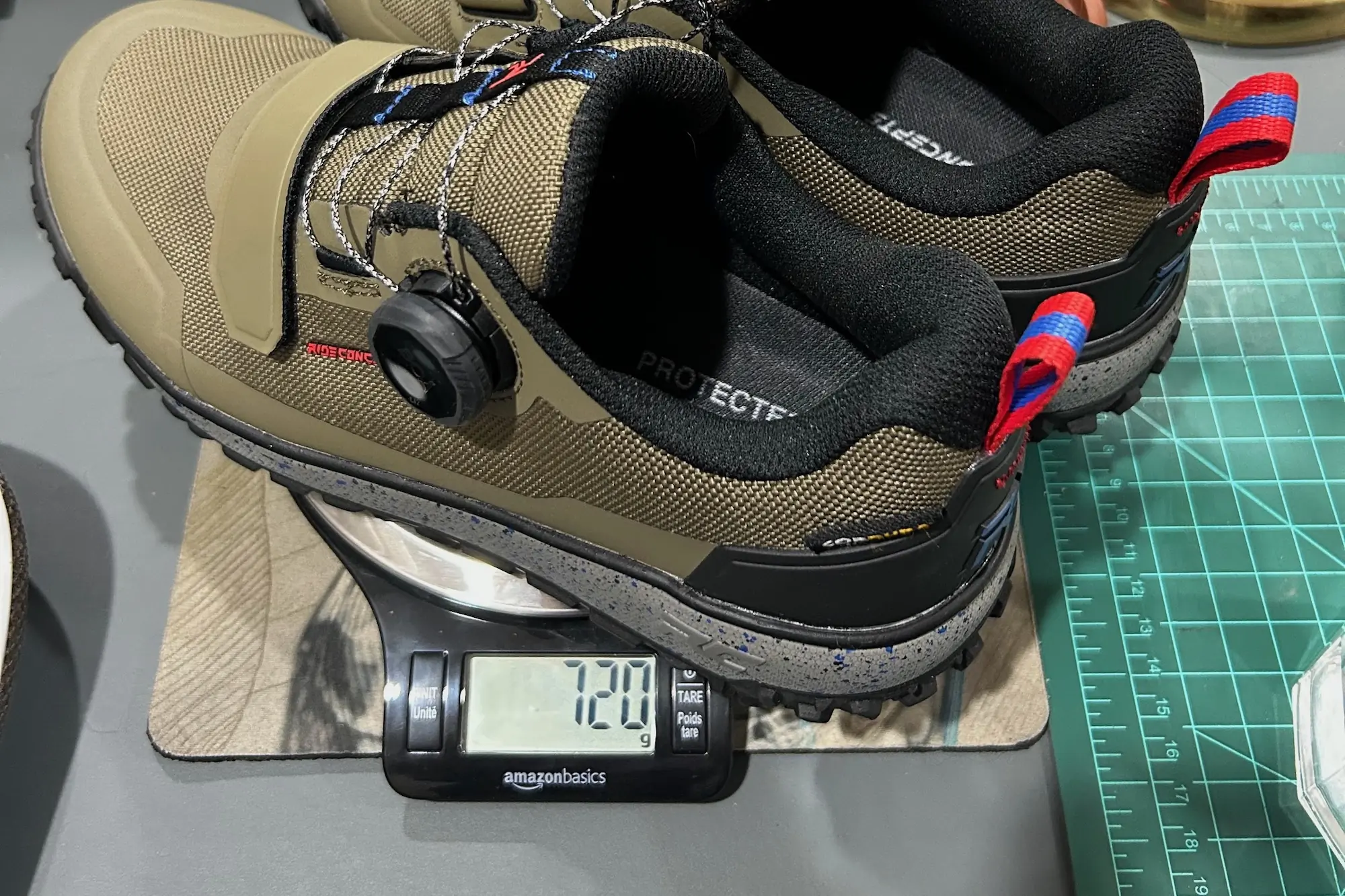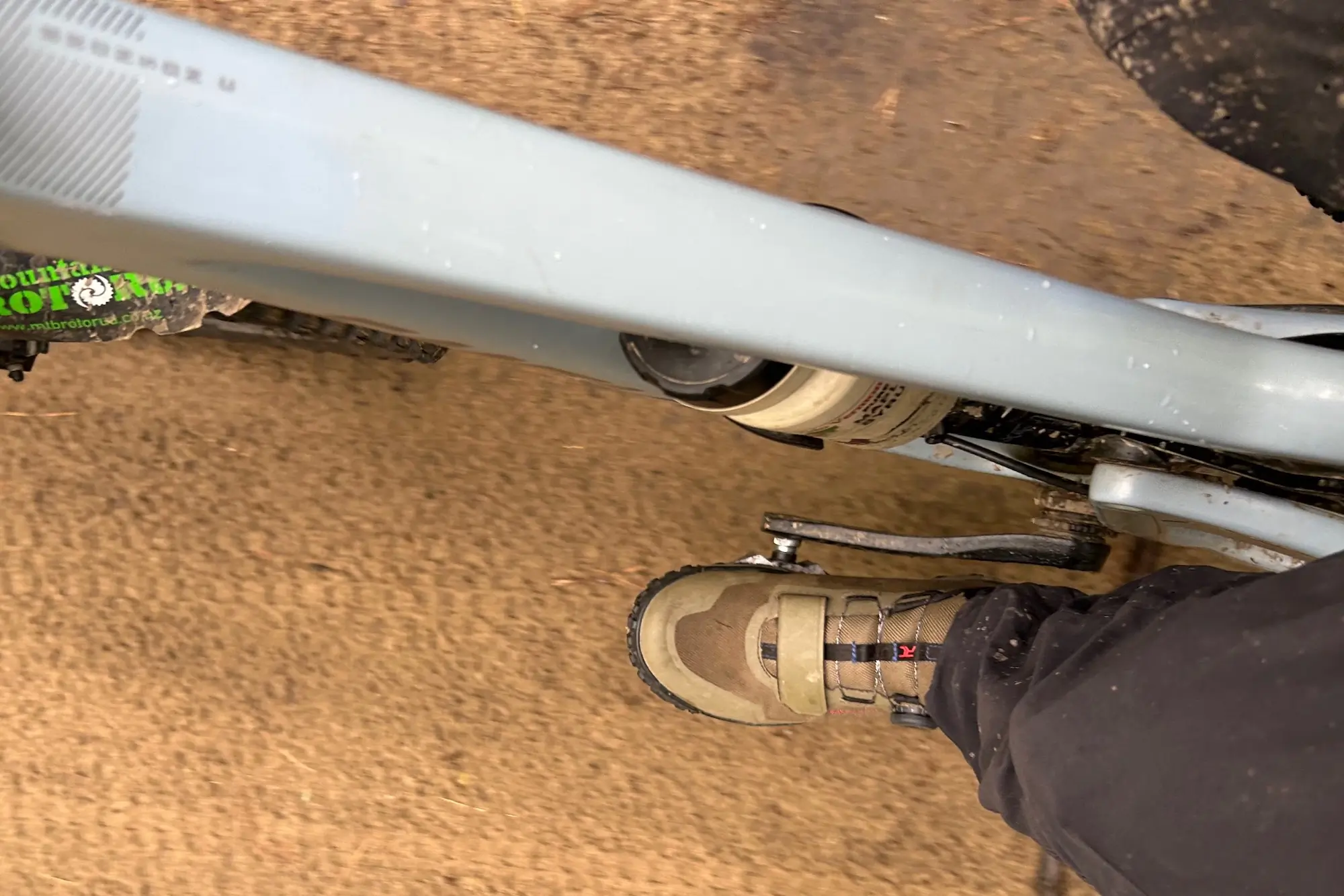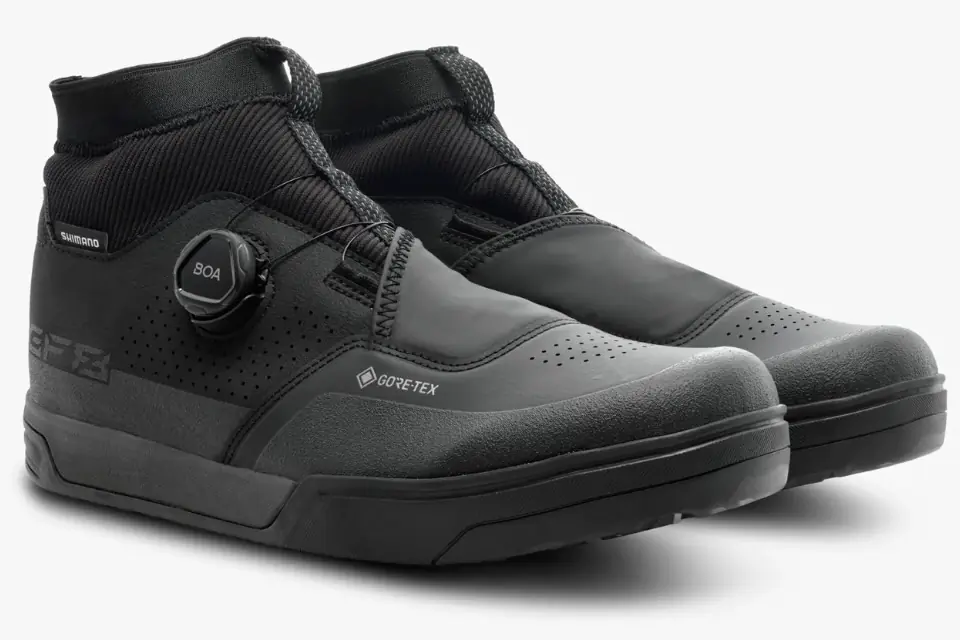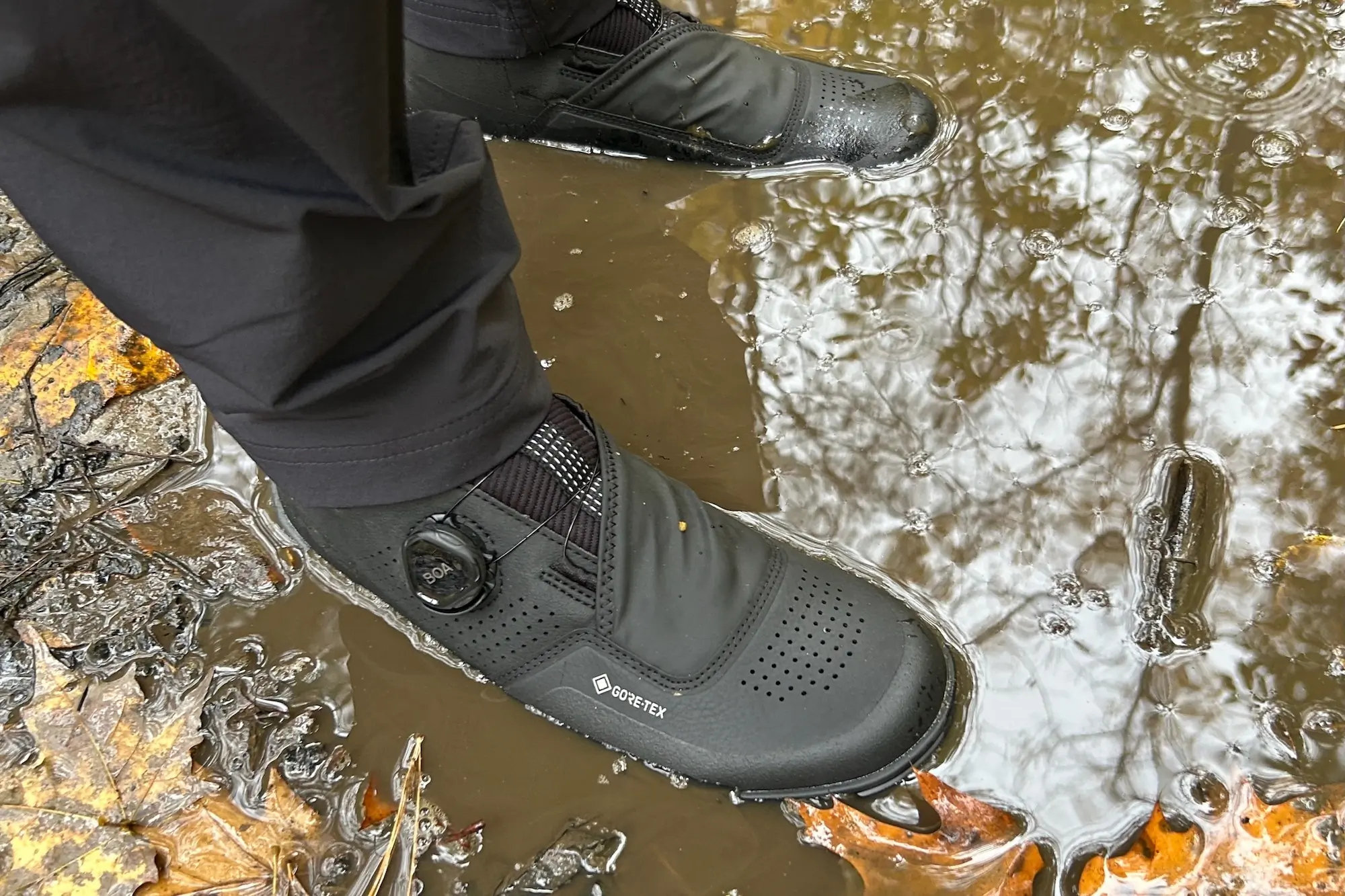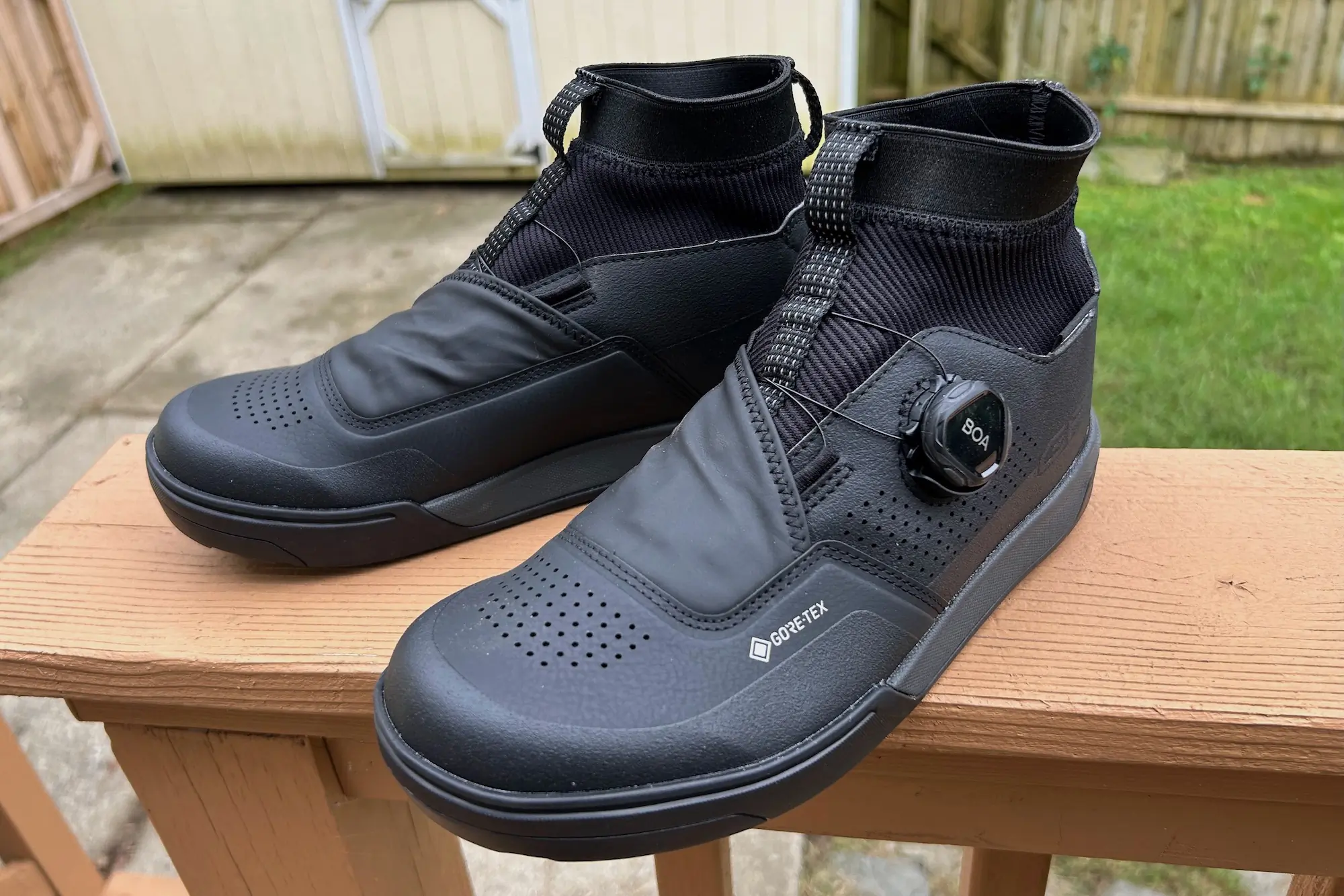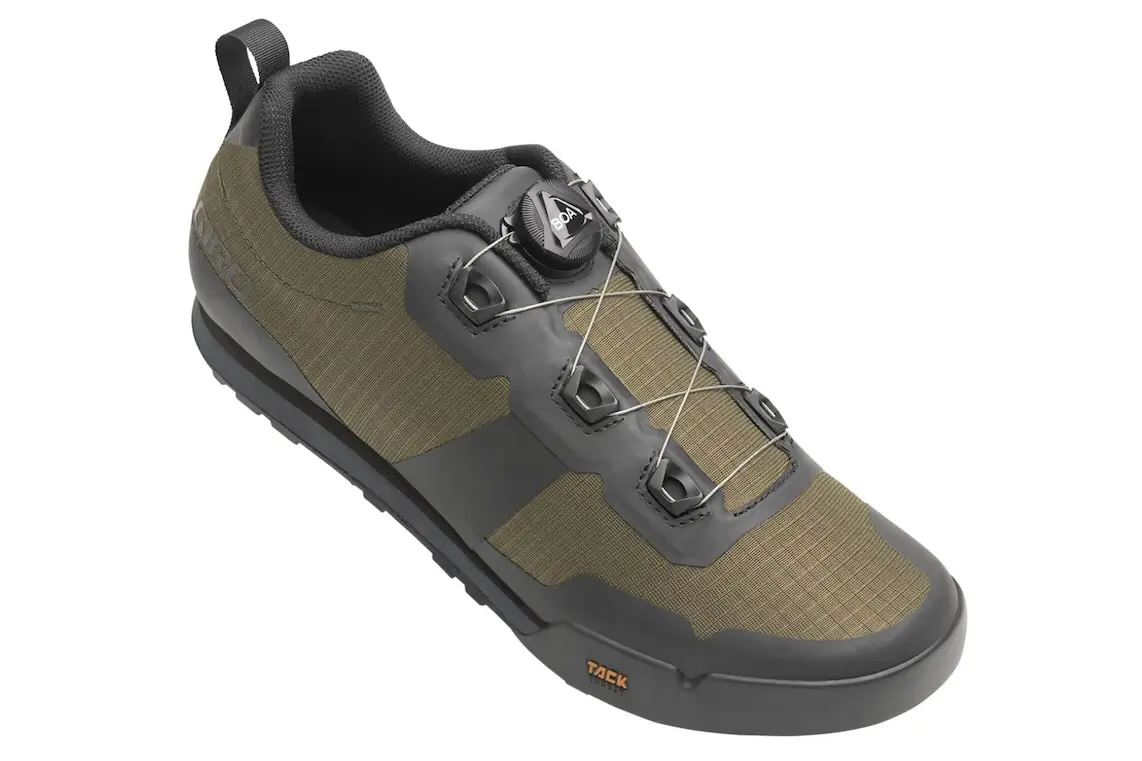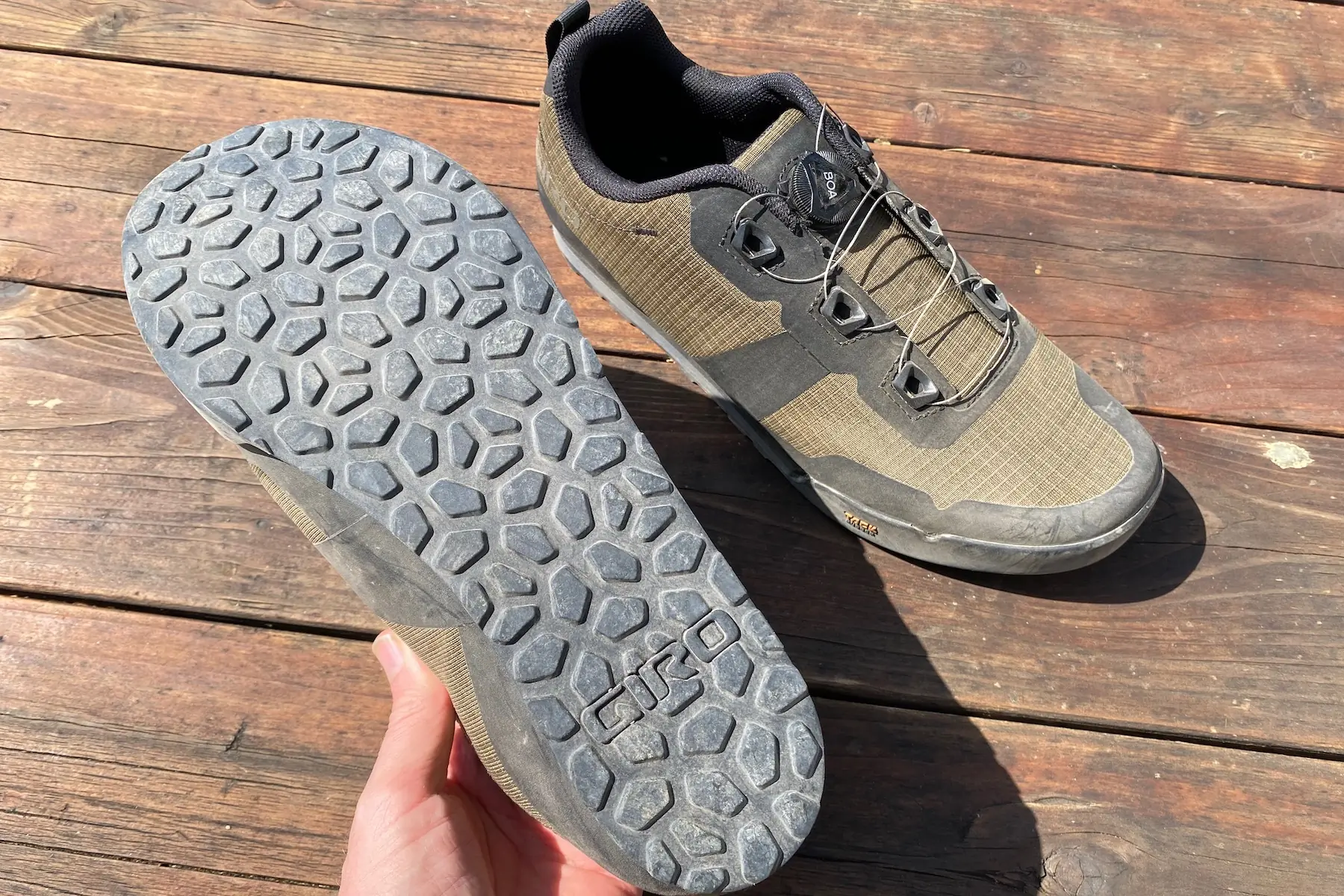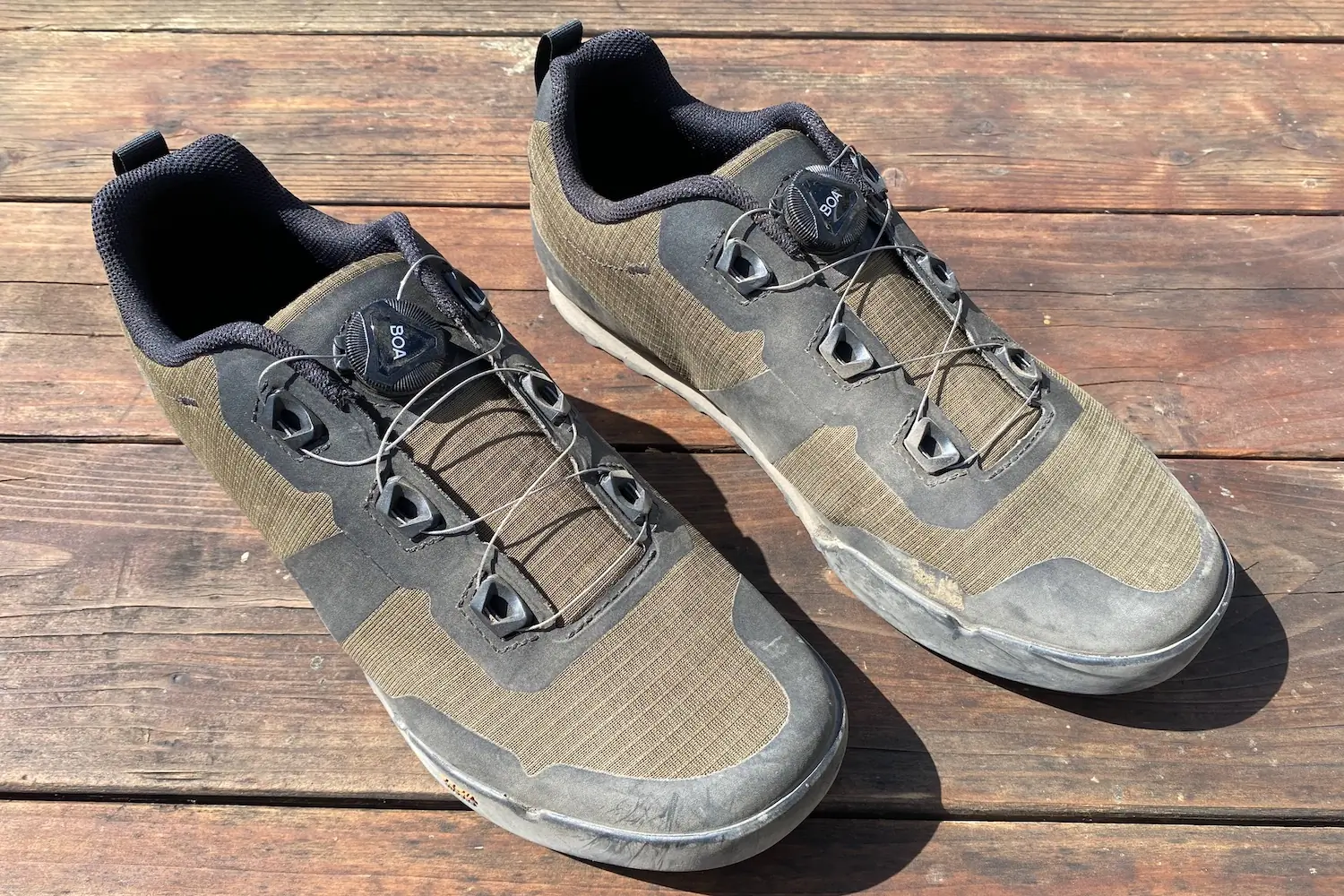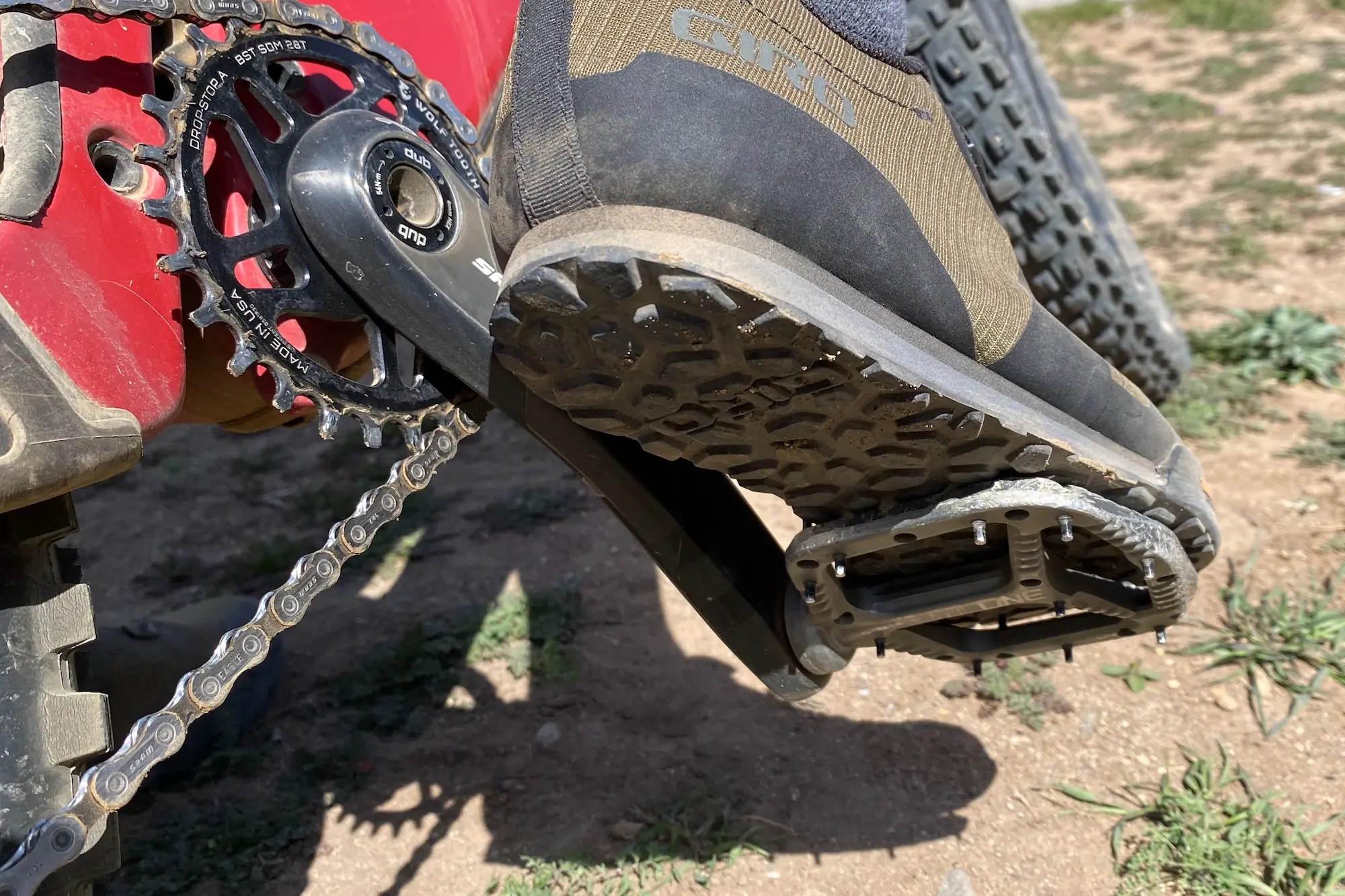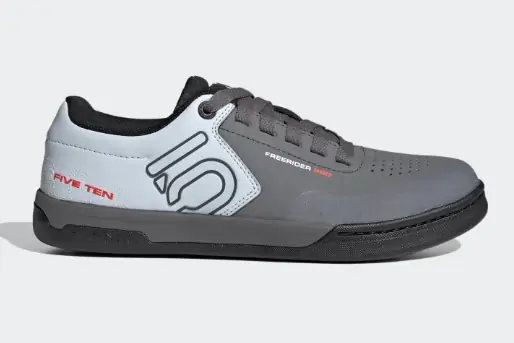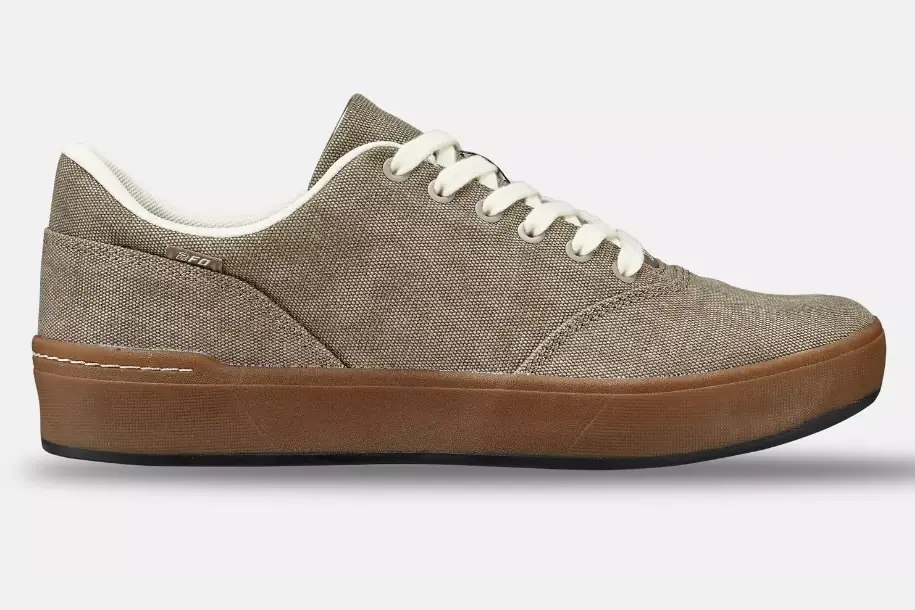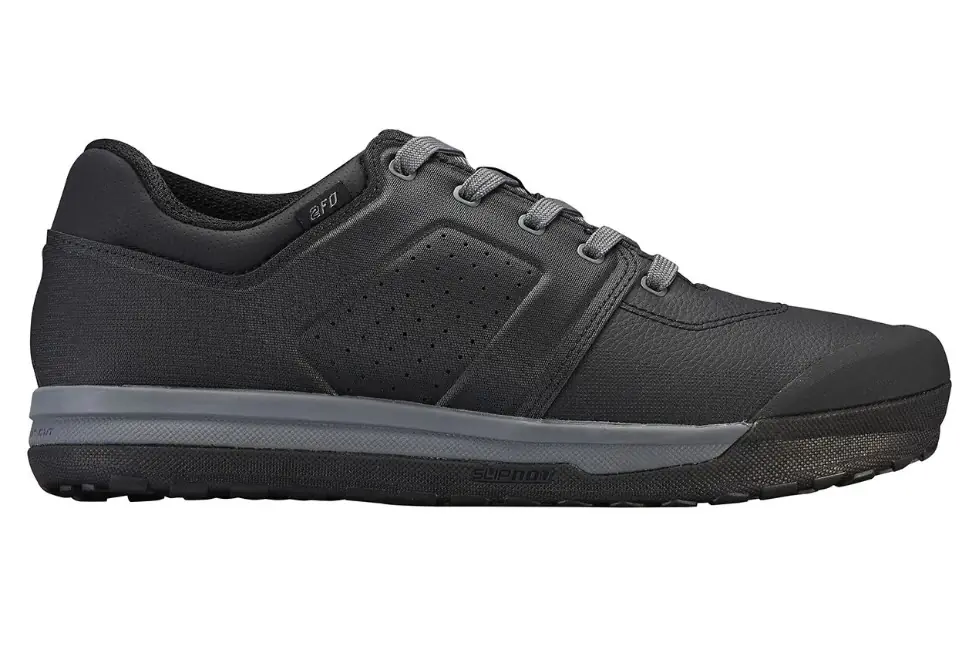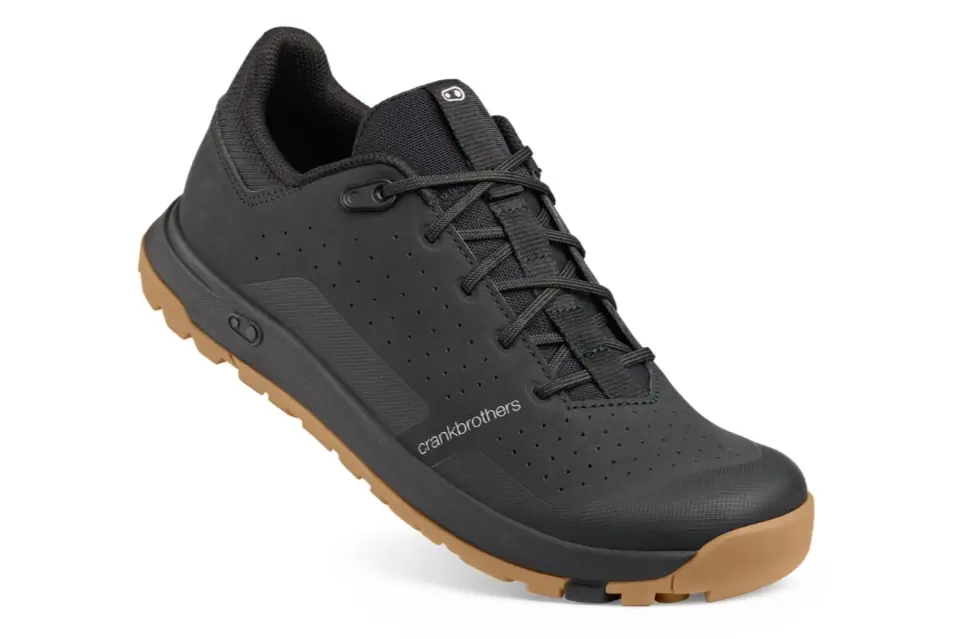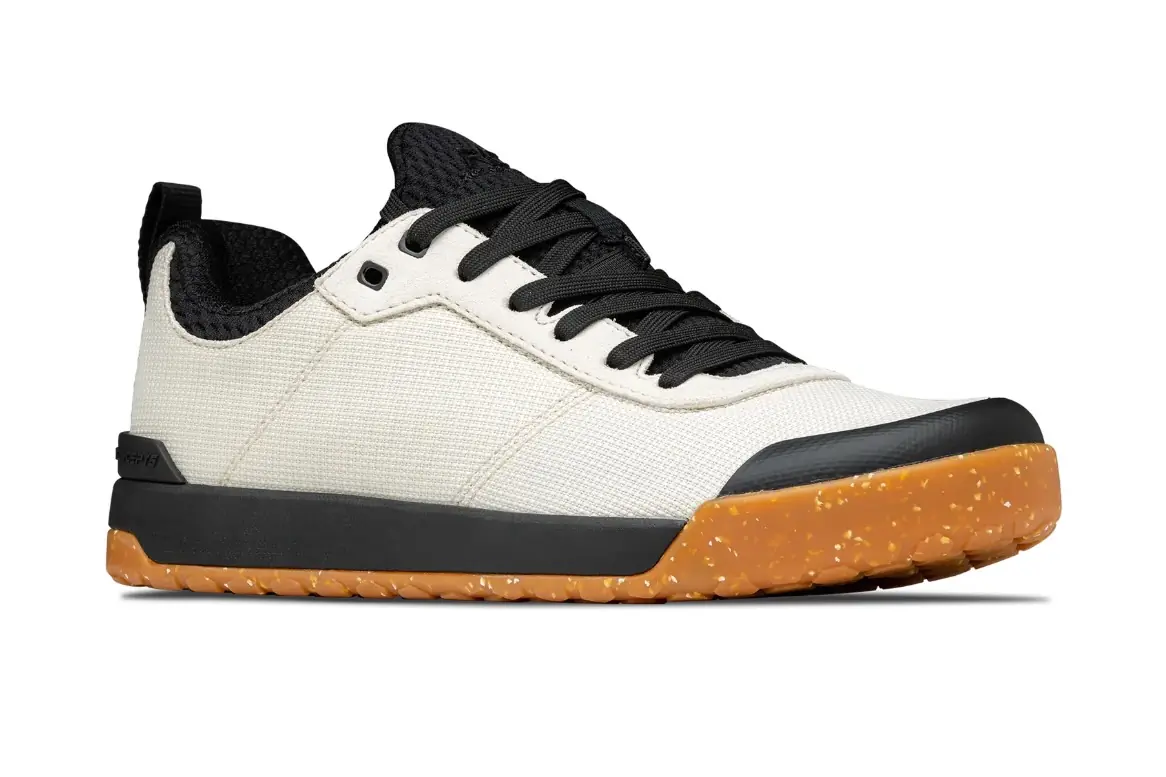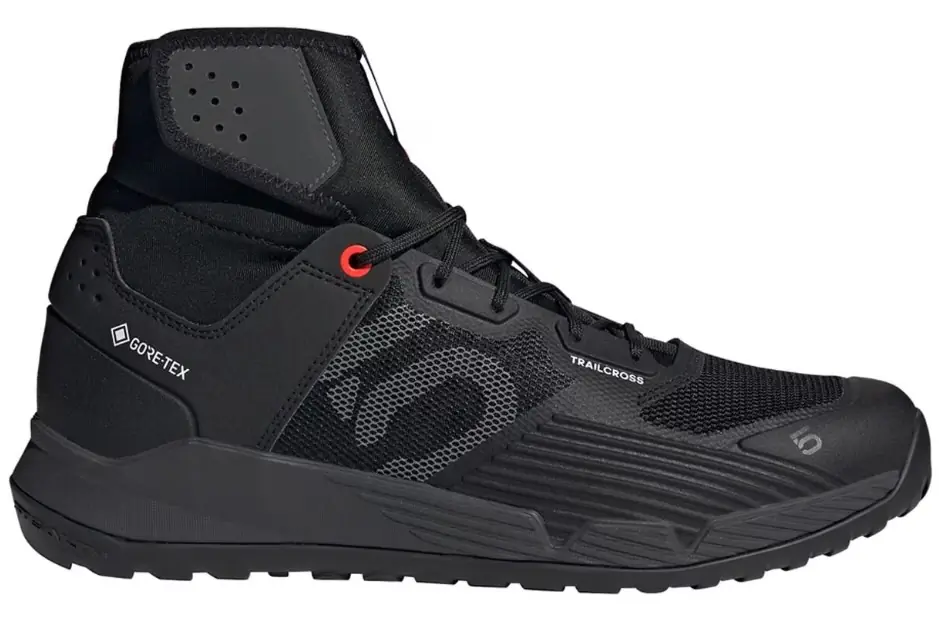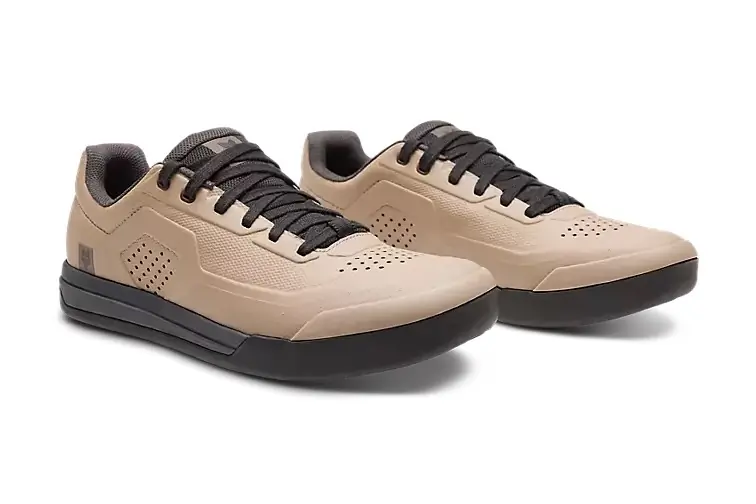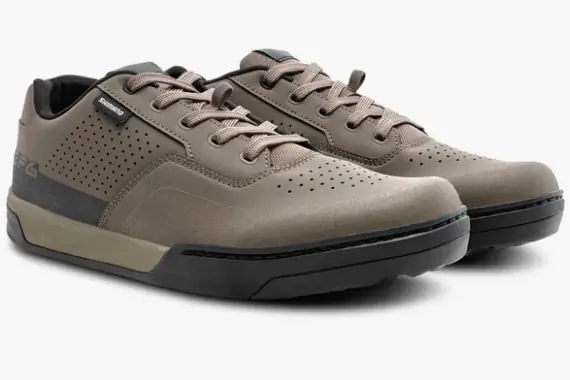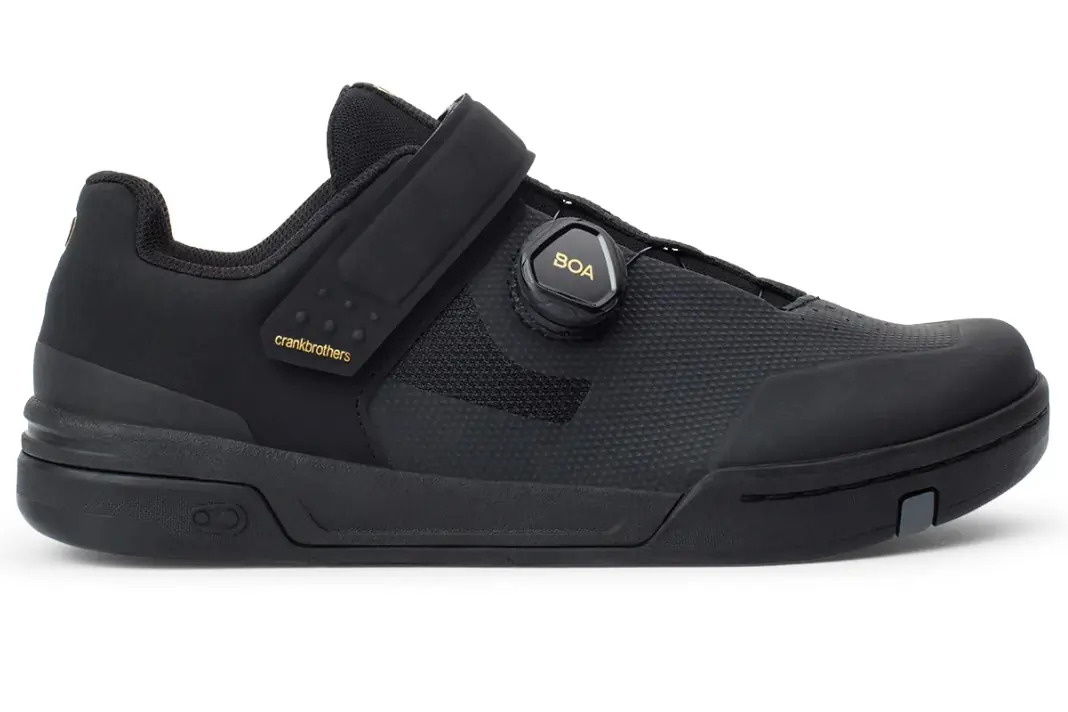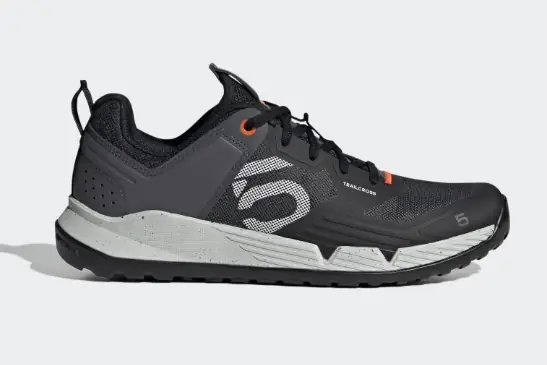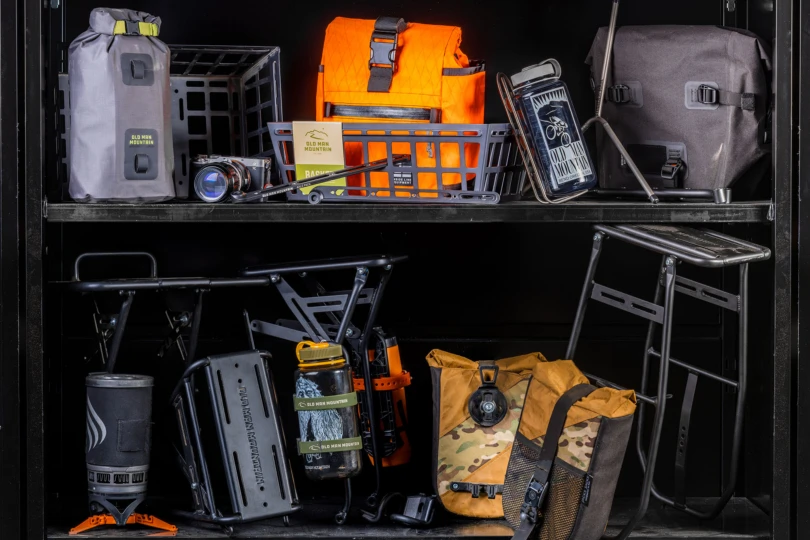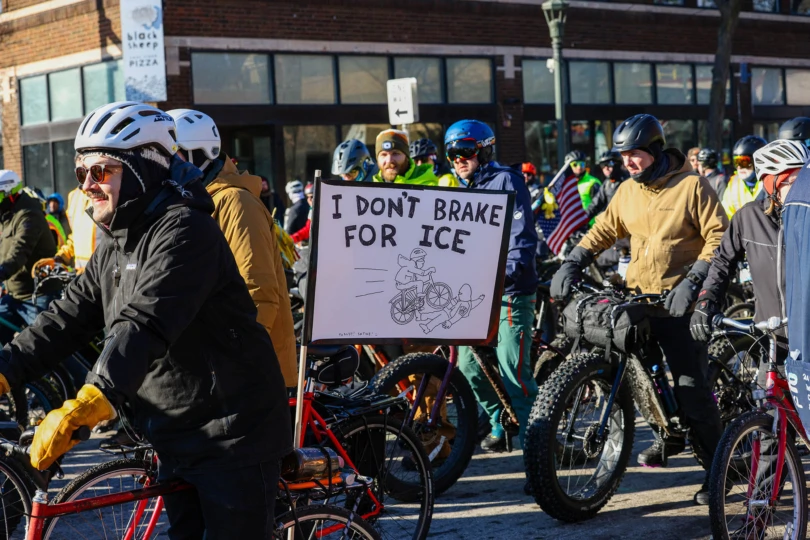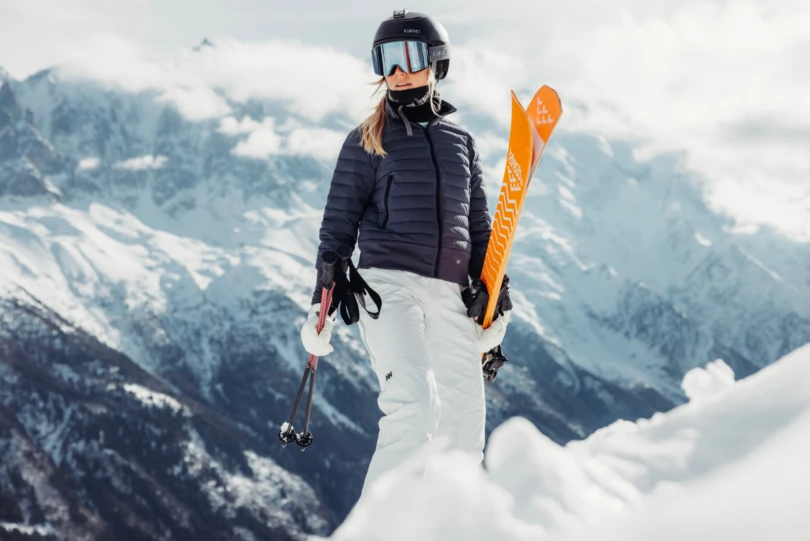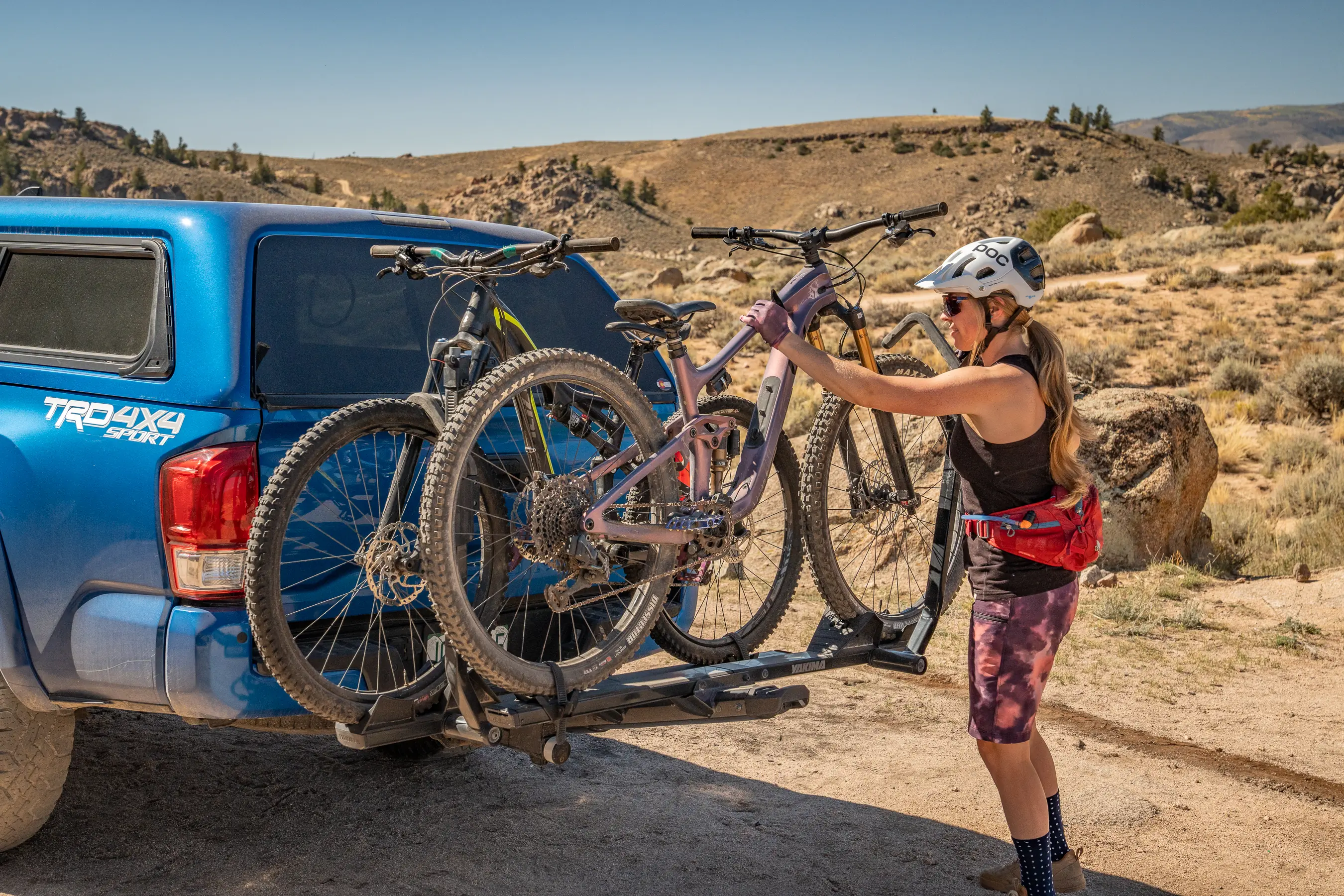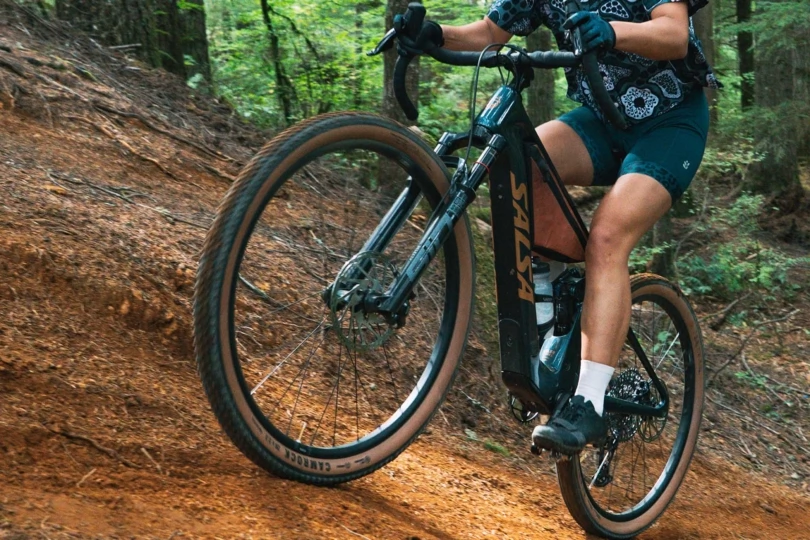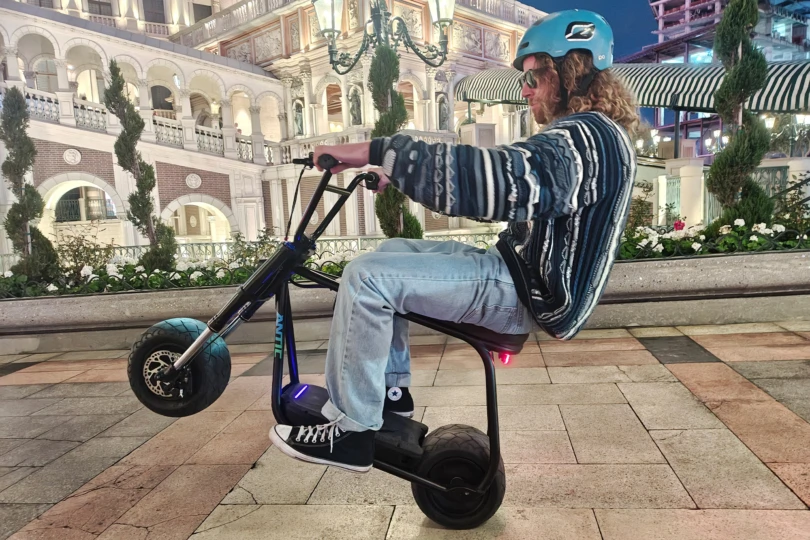Your feet serve as an important contact point on your mountain bike, and the best flat pedal mountain bike shoes provide grip, stability, comfort, and control. Flat pedal shoes should provide reliable traction on your pedals, a supportive platform, efficient power transfer, breathability, water resistance, foot protection, and all-day comfort.
While our options used to be somewhat limited, nowadays, there is a wide variety of flat pedal-specific mountain bike footwear designed to meet the needs of varying riding styles, weather conditions, and personal preferences. To help sort through the options, we gathered a diverse selection of 16 models and tested them for months while analyzing their design, fit, pedal grip, sole stiffness, pedaling efficiency, and overall feel on the pedals and when walking.
From the top-rated Giro Latch to the budget-friendly Ride Concepts Livewire, our top recommendations are listed below. If you’ve landed here in search of mountain bike shoes that clip into your pedals, we’ve thoroughly tested and reviewed the best clipless mountain bike shoes, too.
Editor’s Note: This guide was updated for mountain bike season on April 9, 2025, with the addition of the field-tested Five Ten Freerider Pro BOA and the gravel-friendly Giro Tracker.
The Best Flat Pedal Mountain Bike Shoes of 2025
Giro Latch
- Measured weight: 603 g (pair, size 7.5 US / 40 EU)
- Upper materials: Microfiber
- Outsole: Tack rubber
- Closure: Laces with elastic lace retainer
- Size tested: US men's 7.5 / 40 EU
- Available sizes: Whole: 39-50 EU (no half sizes)
Pros
- Tack rubber sole is supremely grippy, top of class
- Stiffer-than-average sole with controlled, predictable, and supportive flex
- Low stack height
- Excellent muted and predictable feel
- Average breathability and water resistance — dries quickly and easy to clean.
Cons
- Sole is a little stiff for long walks
- Average breathability and water resistance
Ride Concepts Livewire
- Measured weight: 724 g (pair, size 7 US / 39.5 EU)
- Upper materials: Synthetic canvas and microfiber
- Outsole: Max Grip rubber
- Closure: Laces with elastic lace retainer
- Size tested: US men's 7 / 39.5 EU
- Available sizes: Whole: 7-15 US, half: 7.5-12.5 US
Pros
- Max Grip Rubber Outsole provides solid traction
- Reasonable price point
- Solid all-rounder
Cons
- Not the best option for wet days, or very hot days
- Heavier weight
Five Ten Freerider Pro BOA
- Measured weight: 726 g (pair, size 9.5 US)
- Upper materials: Synthetic
- Outsole: Stealth S1 Phantom
- Closure: Boa Li2 dial with textile lace
- Size tested: US men’s 9.5 / 43.5 EU
- Available sizes: Whole: 6-15 US, Half: 6.5-12.5 US
Pros
- Great pedal grip
- Balanced sole stiffness
- Versatile
- BOA lacing convenience
Cons
- Not the most breathable
- Basic footbed
Ride Concepts Tallac BOA
- Measured weight: 720 g (pair, size 7 US / 39.5 EU)
- Upper material: CORDURA
- Outsole: Ride Concepts MAX GRIP
- Closure: BOA, textile TX4 Laces, Velcro strap
- Size tested: 7 US Men's / 39.5 EU
- Available sizes: Whole and half sizes 7-13 US
Pros
- Stiff sole
- Good pedaling efficiency
- Superb traction on and off the bike
- Very walkable
- CORDURA upper breathes well and provides solid water resistance
- BOA closure is quick and easy to deal with, particularly in wet conditions
Cons
- Heavier weight
- Toebox is a little tight in height, but broke in over testing period
- Higher stack height may not be for everyone
- More expensive
Shimano GF800 GTX
- Measured weight: 750 g (pair, size 7 US / 40 EU)
- Upper materials: Synthetic leather upper with GORE-TEX liner
- Outsole: ULTREAD GF
- Closure: BOA with bash guard
- Size tested: 7 US Men's / 40 EU
- Available sizes: Whole: 38-48 EU (no half sizes)
Pros
- Better grip than previous Shimano soles
- TORBAL 2.0 Midsole allows heel to move naturally
- Extremely waterproof
- Flexible GORE-TEX ankle cuff fits well and keeps water out
- Well-executed BOA system with no pinch points
- Slick looks
Cons
- ULTREAD GF rubber outsole provides good, but not great, traction
- Ran slightly larger than other size 40 EU shoes in the test
- Style is potentially polarizing
Giro Tracker
- Measured weight: 706 g (pair, size 44 EU)
- Upper materials: Textile with Thermobonded PU overlays
- Outsole: Tack rubber
- Closure: BOA L6 dial
- Size tested: 44 EU
- Available sizes: 39-50 EU
Pros
- Reasonable price
- Good breathability
- Lightweight
- Stiffer soles – solid pedaling efficiency
- BOA lacing – easy on/off and adjustments
Cons
- No half sizes
- Limited damping from the midsole
- Minimal foot protection
- Flat footbed
Other Flat Pedal Mountain Bike Shoes We Tested
- Measured weight: 627 g (pair, size 7 US / 40 EU)
- Upper materials: Synthetic upper
- Outsole: Stealth S1 Dotty rubber
- Closure: Laces with elastic lace retainer
- Size tested: US Men's 7 / 40 EU
- Available sizes: Whole: 6-15 US, Half: 6.5-12.5 US
Pros
- Well-deserved high reputation
- Outstanding traction
- Fair breathability and water resistance
- The benchmark for flat pedal shoes
- Versatile
Cons
- Lots of visible branding
- Sole may be too soft for some preferences
- Moderate pedaling efficiency
- Stealth rubber does wear quickly
- Measured weight: 540 g (pair, size 7.25 US / 39.5 EU)
- Upper material: Canvas
- Outsole: SlipNot ST (Super Tacky)
- Closure: Laces
- Size tested: 7.25 US men's / 39.5 EU
- Available sizes: Whole: 38-49 EU, Half: 38.5-46.5 EU
Pros
- Excellent tactile feel on the pedals
- Lightweight
- Stylish on and off the bike
- Fairly breathable
- Grips well for intended use (light trail riding, pumptrack, dirt jumps, having fun on bikes)
- Minimal branding, casual style
Cons
- Minimal foot protection
- Soaks through easily on wet days
- Softer sole may not work for everyone
- Measured weight: 734 g (pair, size 7.25 US / 39.5 EU)
- Upper material: Leather and textile upper
- Outsole: SlipNot ST (Super Tacky)
- Closure: Laces with elastic lace retainer
- Size tested: 7.25 US Men's / 39.5 EU
- Available sizes: Whole: 36-49 EU, Half: 38.5-46.5 EU
Pros
- Extremely high traction
- Body Geometry design provides a very comfortable feel on the pedals
- Great balance of water resistance and breathability
- Quick drying
- High level of foot protection
- Minimal branding
Cons
- Might be too grippy for some, can be difficult to reposition feet
- Not the most comfortable walking shoe
- Narrower/more tapered toebox
- Measured weight: 542 g (pair, size 7 US / 39.5 EU)
- Upper materials: Synthetic
- Outsole: Match MC2
- Closure: Laces with lace retainer pocket
- Size tested: US men's 7 / 39.5 EU
- Available sizes: Whole: 3-15 US, half: 5.5-12.5
Pros
- Lightweight
- Very comfortable for riding and walking
- Thin laces are good for wet days and stash in the tongue easily
- Good flex pattern; not a stiff shoe for walking, but stiff enough on the pedals to ride all day
- Versatile breathability/water resistance should handle most environmental conditions
Cons
- Moderate grip; better than previous Crankbrothers shoes we’ve tried, but still not on par with top performers
- Measured weight: 643 g (pair, size 7 US / 39.5 EU)
- Upper material: Nylon upper with suede eye row detail
- Outsole: Ride Concepts MAX GRIP
- Closure: Laces with elastic lace retainer
- Size tested: 7 US Men's / 39.5 EU
- Available sizes: Whole: 7-15 US, Half: 7.5-12.5 US
Pros
- Extremely comfortable
- Solid grip on the pedals
- Reasonable price point
- Good insole/arch support
Cons
- Warmer on the feet
- Not very weather- or water-resistant
- Woven nylon upper traps mud/dirt and gets quite dirty — not the easiest to clean
- Short height in toebox, but it did break in
- Measured weight: 692g (pair, size 5 US)
- Upper materials: Textile with neoprene collar and Gore-Tex membrane
- Outsole: Stealth Dual Compound
- Closure: Laces with neoprene ankle cuff
- Size tested: US Men's 5
- Available sizes: Whole: US Men's 4-15, Half: US Men's 4.5-12.5
Pros
- Waterproof membrane
- Grippy on the pedals
- Easy to walk in
- Warmer than non-GTX version
Cons
- Expensive
- Water can still get in through the top if you're not careful
- Measured weight: 639 g (pair, size 7 US / 39 EU)
- Upper material: Rubbery TPU one piece welded upper
- Outsole: Ultratac rubber
- Closure: Laces with elastic lace retainer
- Size tested: 7 US Men's / 39 EU
- Available sizes: Whole: 37-47 EU, Half: 41.5-45.5 EU
Pros
- Rubbery one-piece upper is very water resistant
- Ultratac rubber sole with low profile hexagonal lugs provides solid traction in all conditions
- Precise and responsive fit
- Low stack height gives good pedal feel
- Crowd-pleasing sole stiffness
Cons
- Slightly slimmer fit might not be for everyone
- Upper can get a little hot on humid days, not the most breathable shoe
- Stock laces are pretty short
- Measured weight: 721 g (pair, size 7 US / 40 EU)
- Upper materials: Synthetic leather upper with mesh-lined perforated venting areas
- Outsole: ULTREAD GF
- Closure: Laces with elastic lace retainer
- Size tested: 7 US Men's / 40 EU
- Available sizes: Whole: 38-48 EU (no half sizes)
Pros
- ULTREAD GF outsole is grippier than previous Shimano soles
- Good water resistance/breathability balance
- Durable construction throughout
- Raised medial ankle support
- High-quality laces
- TORBAL 2.0 Midsole allows heel to move naturally
Cons
- ULTREAD GF rubber outsole has good but not exceptional grip
- Ran slightly larger than other size 40 EU shoes in the test
- Laces are a touch long
- Slightly more expensive than similar competitors
- Measured weight: 664 g (pair, size 7 US / 39.5 EU)
- Upper material: Rubbery upper (70% PU, 25% polyester, 5% PU Film)
- Outsole: Match MC2 rubber
- Closure: BOA L6, low-friction wire, Velcro strap at top
- Size tested: 7 US men's / 39.5 EU
- Available sizes: Whole: 5-14 US, Half: 5.5-12.5 US
Pros
- Exceptional fit and feel on foot
- Great pedal feel from raised toe sole profile and medium flex
- Moderate breathability and great water resistance
- Solid mid-range level of protection
Cons
- Lower level of traction/grip
- More expensive
- Measured weight: 654 g (pair, size 7 US / 40 EU)
- Upper material: Mesh upper
- Outsole: Stealth Phantom rubber
- Closure: Laces with elastic lace retainer
- Size tested: US 7 Men's / 40 EU
- Available sizes: Whole: 6-15 US, Half: 6.5-12.5 US
Pros
- Very open and breathable, quick drying
- Most comfortable walking shoe in the test
- Lightweight
- Good, but not great, traction on the pedals
Cons
- Good, but not great, traction on the pedals
- A little underwhelming for aggressive riding
- Very little padding and foot protection
Mountain Bike Flat Pedal Shoes Comparison Chart
| Flat Pedal Shoe | MSRP | Measured Weight (pair, size) | Outsole | Closure |
|---|---|---|---|---|
| Giro Latch | $150 | 603 g (7.5 US / 40 EU) | Tack rubber | Laces |
| Ride Concepts Livewire | $110 | 724 g (7 US / 39.5 EU) | Max Grip rubber | Laces |
| Five Ten Freerider Pro BOA | $170 | 726 g (9.5 US / 43.5 EU) | Stealth S1 rubber | BOA Li2 dial |
| Ride Concepts Tallac BOA | $200 | 720 g (7 US / 39.5 EU) | Max Grip rubber | BOA with Velcro strap (Lace version available) |
Specialized 2FO DH | $150 | 734 g (7.25 US / 39.5 EU) | SlipNot ST rubber | Laces |
| Shimano GF800 GTX | $220 | 750 g (7 US / 40 EU) | ULTREAD GF | BOA |
| Giro Tracker | $130 | 706 g (10.5 US / 44 EU) | Tack rubber | BOA L6 dial |
| Five Ten Freerider Pro | $160 | 627 g (7 US / 40 EU) | Stealth S1 rubber | Laces |
| Specialized 2FO Method | $100 | 540 g (7.25 US / 39.5 EU) | SlipNot ST rubber | Laces |
| Crankbrothers Stamp Trail Lace | $150 | 542 g (7 US / 39.5 EU) | Match MC2 | Laces (BOA version available) |
| Ride Concepts Accomplice | $130 | 643 g (7 US / 39.5 EU) | Max Grip rubber | Laces (BOA version available) |
| Five Ten Trailcross GTX | $220 | 692 g (5 US) | Stealth Phantom rubber | Laces |
| Fox Union Flat | $150 | 639 g (7 US / 39 EU) | Ultratac rubber | Laces |
| Shimano GF600 | $160 | 721 g (7 US / 40 EU) | ULTREAD GF | Laces |
| Crankbrothers Stamp BOA | $180 | 664 g (7 US / 39.5 EU) | Match MC2 rubber | BOA with Velcro strap (Lace and Speedlace versions) |
| Five Ten Trailcross XT | $160 | 654 g (7 US / 40 EU) | Stealth Phantom rubber | Laces |
How We Tested the Best Flat Pedal Mountain Bike Shoes
Our bike editors have been obsessing over the latest and greatest products for well over a decade. As a team of die-hard cyclists, we’re always seeking the best gear that can enhance our experience and improve our performance whether that’s bikes, wheels, tires, helmets, or footwear. Whether for personal use or reviews, we’re constantly getting our hands on the latest and greatest mountain bike shoes to put through the wringer.
We tapped contributor Paul Clauss for the majority of the testing. Paul is an avid mountain biker, mountain bike coach, trail builder, and mechanical engineer. A dedicated flat pedal rider, Paul has been riding in flat pedal shoes for many years and has developed a keen sense for the performance characteristics that make a quality shoe.
Hailing from northern Vermont, Paul has some of the best riding on the East Coast close to home. The punchy technical terrain of Vermont serves as an ideal testing ground with short, sharp climbs and steep, rocky, and rooty descents that will challenge the grip of any outsole compound and tread design. The wildly variable weather of northern New England also provided conditions ranging from cool to extremely hot and humid to dry and historically wet and rainy. During testing, these shoes really saw a little bit of everything.
For the purposes of this buyer’s guide, we gathered 16 of the best flat pedal shoes available in 2025 to test and compare. Each model was closely examined right out of the box before being weighed for consistency and comparison to manufacturers’ claims. The real testing came out on the trails where Paul spent months taking them out on daily rides.
He switched frequently between flat pedal models to analyze the shoes’ grip across different pedal profiles, platform sizes, and pin layouts. Additionally, he swapped between shoe models regularly for back-to-back comparisons of important performance characteristics like pedaling efficiency, stability, fit, comfort, weather resistance, and breathability.
In addition to testing flat pedal shoes, Paul has also tested the best flat pedals and the best dropper posts for comprehensive buyer’s guides. If you’re in the market for a new mountain bike helmet, we’ve tested those, too. And, if you’re a clipless pedal rider, we’ve thoroughly tested and reviewed the best clipless mountain bike shoes and have recommendations for everything from XC to trail and DH riding.
Buyer’s Guide: How to Choose the Best Flat Pedal Mountain Bike Shoes
With so many options on the market, choosing the right pair of flat pedal shoes can seem like a daunting task. With Five Ten dominating the market for a long time, the decision used to be a bit more straightforward, but now there are more choices than ever before to cover the needs of everyone, from downhill rippers to trail riders.
We suggest considering several variables when searching for flat pedal shoes: your riding style, fit/comfort, grip/traction, sole stiffness, foot protection, weather resistance, and walkability. We discuss each in greater detail below.
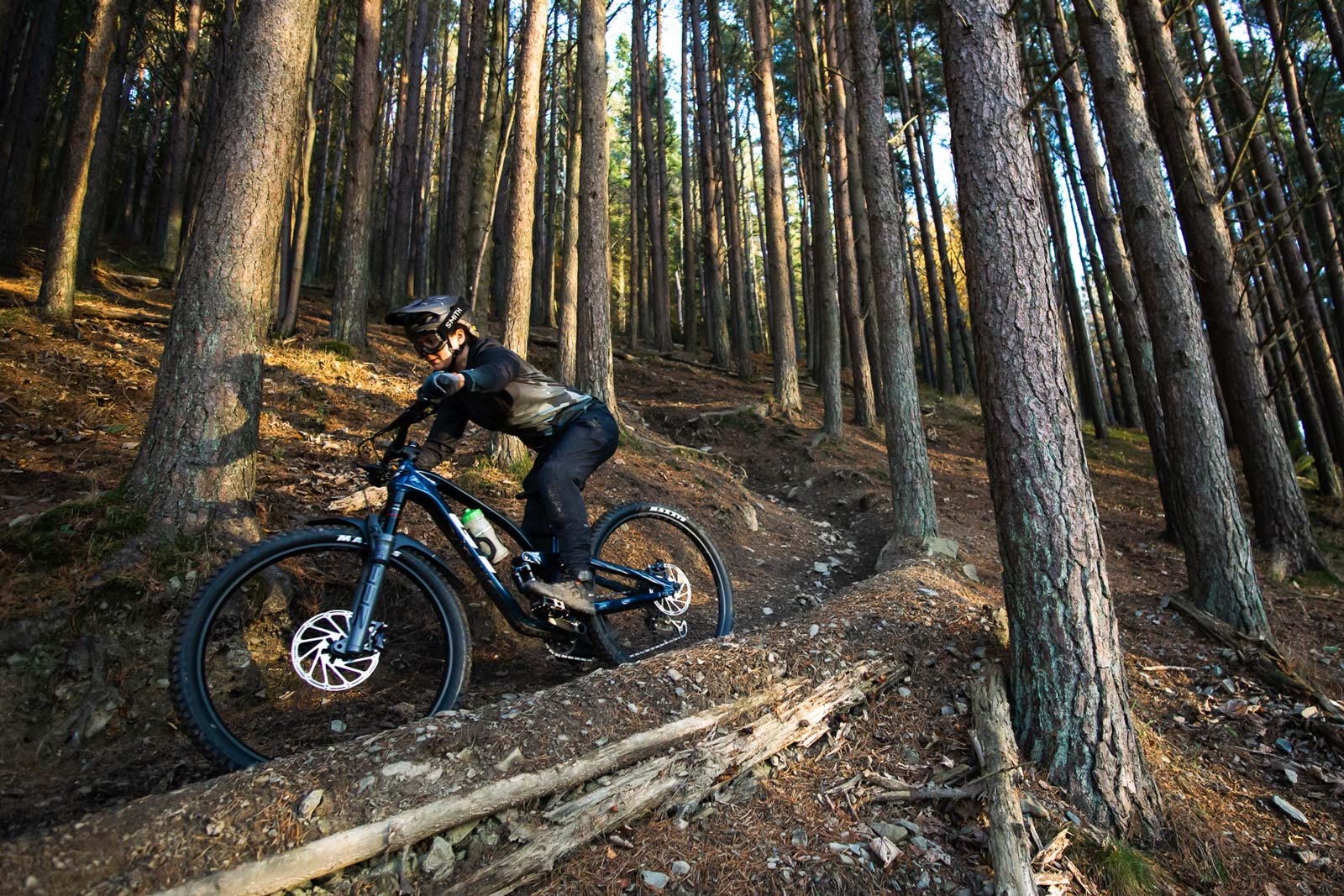
What Type of Riding Do You Do?
It may seem obvious, but the type of riding you do most often should be considered when looking for new flat pedal shoes. There are lots of different models out there designed to meet the demands of different riding styles, so one should be able to find the right shoes for the job.
Downhill riders who spend their days riding chairlifts or shuttles to the top of rough, high-speed descents will often seek shoes with more supportive and protective uppers, impact-absorbing materials, and grippy soles that will keep your feet stuck on the pedals through the chatter of rock gardens and braking bumps.
Trail and all-mountain riders who spend their days pedaling to the top of their descents will often steer towards a more balanced, versatile shoe that is moderately protective, pedals efficiently, provides adequate grip, and is possibly better ventilated and slightly lighter weight.
People who frequent the pump track or dirt jumps tend to prefer slightly softer flexing soles for pedal feedback and often gravitate to moderately grippy soles for better foot mobility for doing tricks.
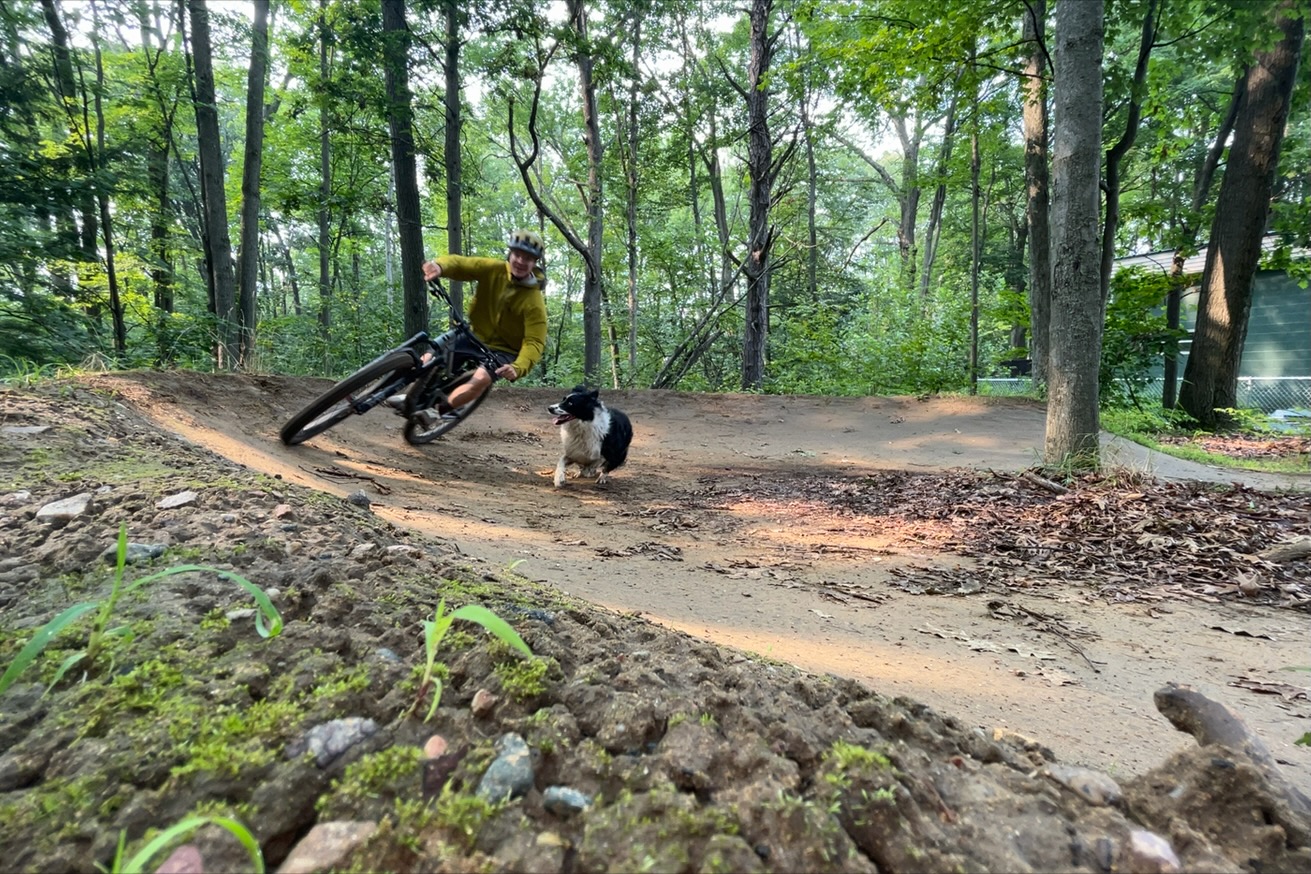
Fit and Comfort
Fit is always one of the most important considerations because it directly impacts your comfort and control of the bike. How a shoe fits is also a personal preference, with some people gravitating toward a more snug and precise fit while others may enjoy a looser and more forgiving approach.
Finding the right fit for you is often best achieved by trying shoes on so you can ensure that the length, width, and volume of the shoe are right for your specific foot size and shape. This is particularly important for those with notably narrow or wide feet, as most shoes are made to fit average width/volume feet.
Your regular sneaker or hiking boot size can be a good starting point, although some riders size down a half size or so to get a more snug fit for foot stability and control reasons. If you already know your flat pedal shoe size, it is usually fairly consistent within the same brand, though it can vary slightly between different brands, as their U.S. and EU sizes may not line up exactly the same on their size charts. It is definitely worth referencing the size charts and trying on shoes whenever possible.
Fit is one of the primary factors that dictate your overall comfort. Too small of a shoe, and you can experience hot spots, foot cramps, or scrunched toes. Too loose, and your foot may slip around inside the shoe, which may result in blisters or a reduction of stability and control. Likewise, different materials, levels of padding, ventilation, and the closure system can play a role in how the shoe conforms to your foot and how comfortable it is over the course of a long ride or season of riding.
Arch support is another consideration, as most brands aim to create a shoe that works for most people and typically involves an insole that has an average amount of arch support. Those who have specific arch support needs will often benefit from the use of an aftermarket or custom insole to find the level they need.
The intended use of a shoe can also affect comfort. Shoes with stiffer soles prioritize pedaling efficiency and support but may sacrifice off-the-bike comfort and performance as a result. The Specialized 2FO DH Flat, for example, handles the impacts and loads of DH riding well but isn’t super comfortable to walk in for extended periods — it’s a shoe built for downhill performance.
In contrast, the Five Ten Trailcross XT is super comfortable for walking around all day, but the comparatively softer sole and less protective upper may not be the best choice for super rough downhills. Matching your riding style and terrain with a shoe’s intended use is a good recipe that should help enhance comfort based on your needs and preferences.
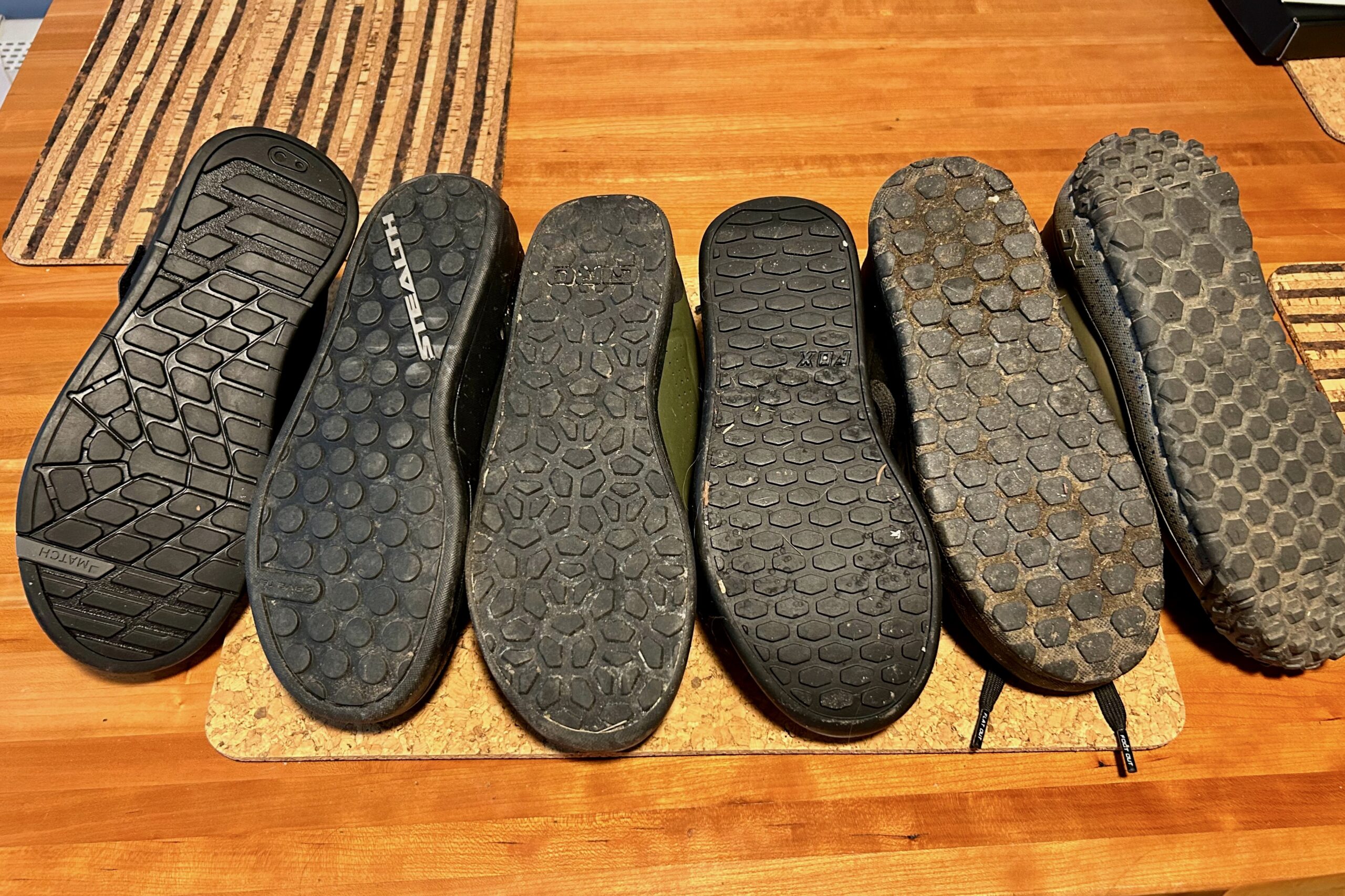
Grip and Traction
For most flat pedal riders, the grip on the pedals is one of the highest priorities, though this varies somewhat depending on riding style, terrain, and personal preferences. While many people want a locked-in, glued-to-the-pedal feel for security, control, and safety, others may enjoy a bit more freedom of movement and foot mobility.
The pedal grip provided by a flat pedal shoe depends on the outsole material, tread pattern, height of the lugs, and dampening from the midsole, as well as the flat pedals you use. Most flat pedal shoes rely mainly on using soft, tacky rubber with low-profile lugs to provide a friction-based grip that the pedal pins can settle into.
But, others may use more of a mechanical connection approach where the pins settle into channels in the sole or against the edges of the tread lugs. The Crankbrothers Stamp BOA, for example, aims to combine friction with mechanical grip by patterning their sole pattern after the footprint of its Stamp pedals.
Only a few years ago, Five Ten’s Stealth rubber compounds were dominant in the grip department and are the reason its shoes were and continue to be some of the most popular on the market. Five Ten’s Stealth rubber is still a great choice, but thankfully, other companies’ outsoles are catching up and providing competitive levels of grip.
These days, Giro’s Tack rubber, Ride Concepts’ Max Grip, and Fox’s Ultratac outsoles provide a very similar level of grip and traction on the pedals to Five Ten’s Stealth S1, while Specialized’s SlipNot ST felt the grippiest when tested side by side.
In terms of pure grip and the feeling of being truly stuck to the pedals, the Specialized 2FO DH Flat and its SlipNot ST outsole were just a cut above the rest. Just a hair below, the Fox Ultratrac, Ride Concepts Max Grip, Five Ten Stealth S1, and Giro Tack compounds provide a very balanced feel with super reliable traction and a bit more forgiveness in regard to foot repositioning. Again, the pedals you choose are a major factor in the grip equation as well.
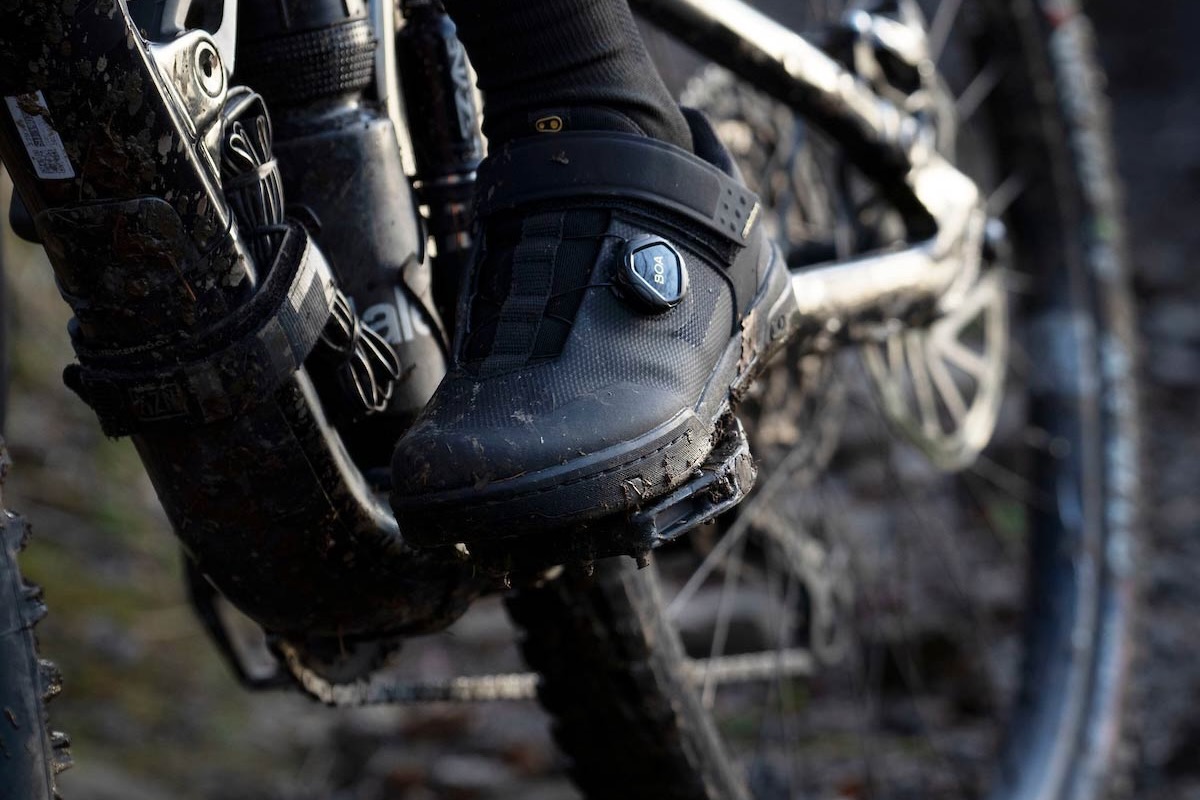
Sole Stiffness
The stiffness of the sole of a flat pedal shoe impacts pedaling efficiency, the support and feel of the shoe when riding, and how the shoe performs when walking. A stiff shoe will be slightly more efficient on long pedal-heavy rides and more supportive on long or rough descents, while a softer shoe will typically provide a more tactile feel on the pedals but less support, which can lead to foot fatigue or soreness over time.
Most shoes strike a good balance with some outliers on either end of the sole stiffness spectrum designed to meet more specific needs. Like most other things, this is generally a personal preference based on the type of riding you do and the desired performance characteristics you seek from your shoes.
Given their long-standing popularity in the market, the Five Ten Freerider Pro is a bit of a benchmark that many people may already be familiar with. After riding a variety of shoes, we found the Freerider Pro to be about average in terms of sole stiffness, with a slight increase on the Giro Latch, as well as a significant increase on the Ride Concepts Tallac BOA and Specialized 2FO DH Flat.
Despite their higher level of stiffness, all three of those models still have a good pedal feel that avoids feeling too wooden while providing a bit more efficiency and reducing foot fatigue on longer rides or rough descents. Still, the sweet spot for many riders will likely be the moderate stiffness of something like the Freerider Pro, Fox Union, or Ride Concepts Accomplice.
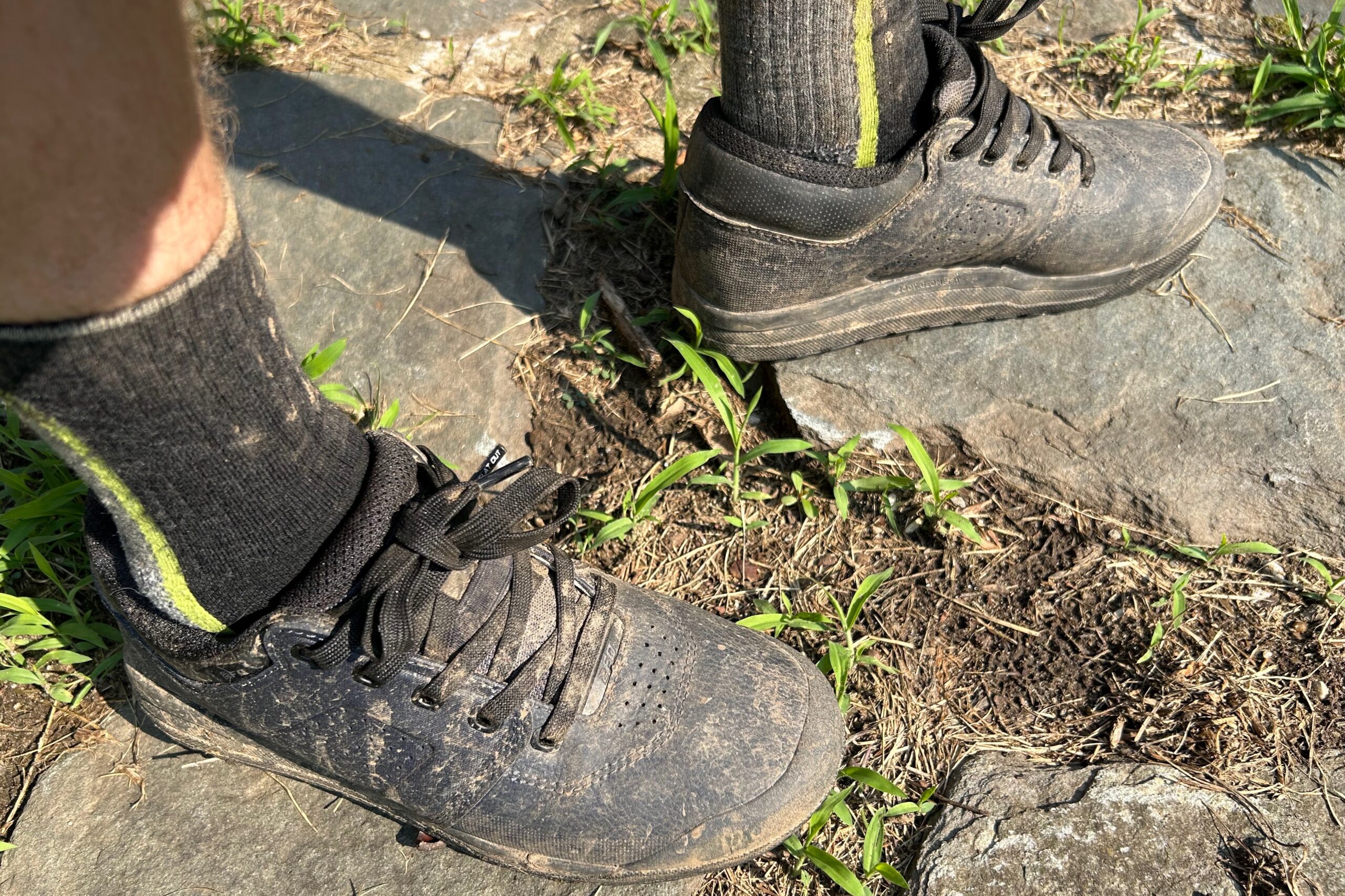
Foot Protection
The amount of foot protection to look for in a flat pedal shoe depends on what you plan to use them for. Nearly all of the shoes in this buyer’s guide have a reinforced toebox and some degree of heel/ankle padding, with the exception of the more casual Specialized 2FO Method. If you find yourself stubbing your toes frequently while riding, a larger, stronger toebox is a good choice. If you are an aggressive downhill rider, you might look for a more protective option with more padding extending through the entire shoe.
Most of the shoes we tested are versatile, all-around models that have moderate foot protection. Shoes like the Five Ten Freerider Pro and Giro Latch look nearly identical, and both have synthetic uppers, reinforced toeboxes and heels, and light padding throughout.
Both the Fox Union Flat and the Crankbrothers Stamp BOA offer similar levels of reinforcement to the aforementioned models, but their rubbery TPU-coated uppers have a slightly tougher, more durable feel. All four of these shoes offer adequate protection for trail and all-mountain riding, and some people will even use them for more aggressive gravity riding, too.
The most protective shoe we tested in the DH-oriented Specialized 2FO DH Flat. This burly shoe features a heavily reinforced toebox as well as a raised medial ankle cuff to provide added ankle protection. Not far behind, the Ride Concepts Tallac BOA is another burly shoe that isn’t specifically designed for DH but should certainly be able to handle it and other aggressive riding scenarios.
At the opposite end of the spectrum, the casual-looking Specialized 2FO DH Method is essentially a canvas shoe with a mountain bike sole, and it offers little in the way of protective features. Similarly, the adventure-oriented Five Ten Trailcross XT has a reinforced heel cup and lightly reinforced toebox, but the mesh uppers are otherwise quite thin and less protective than thicker materials.
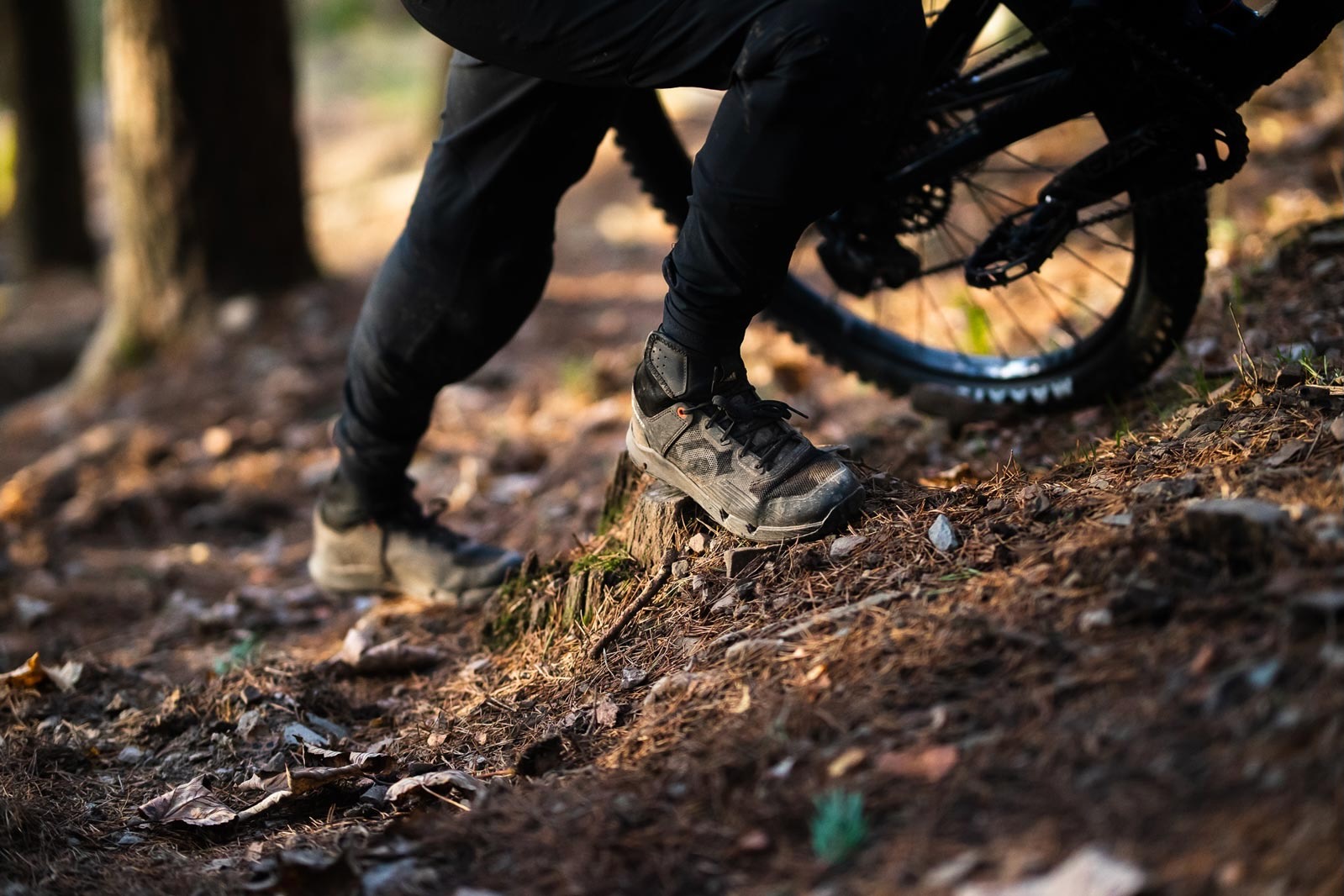
Walkability
As with the other flat pedal shoe considerations, the walkability of a pair of mountain bike shoes will vary in importance depending on your needs. Many people ride less technical trails that do not require frequent dismounts, while others may face technical rock gardens, significant hike-a-bike sections, or like to session features regularly.
Most shoes are designed with on-the-bike performance as their priority, with their walkability as a complete afterthought, though some shoes aim to perform well off the bike, too. You can generally tell which shoes are best for walking by looking at them — they look like light hiking/running shoes or hiking boots.
Of the shoes tested, we found the Five Ten Trailcross XT, Trailcross GTX, and Ride Concepts Tallac BOA the best for hiking, with the softer Trailcross XT better for short distances and the stiffer sole of the Tallac BOA more supportive for more technical terrain. The other shoes were fairly similar for walking with their flat soles, lower profile treads, and relatively traditional flat pedal shoe forms.
They all work well enough to walk relatively normally, but you wouldn’t go out of your way to walk around in them for too long. Still, they will all get you out to that viewpoint or back up the trail to try that tricky section again with little to complain about.
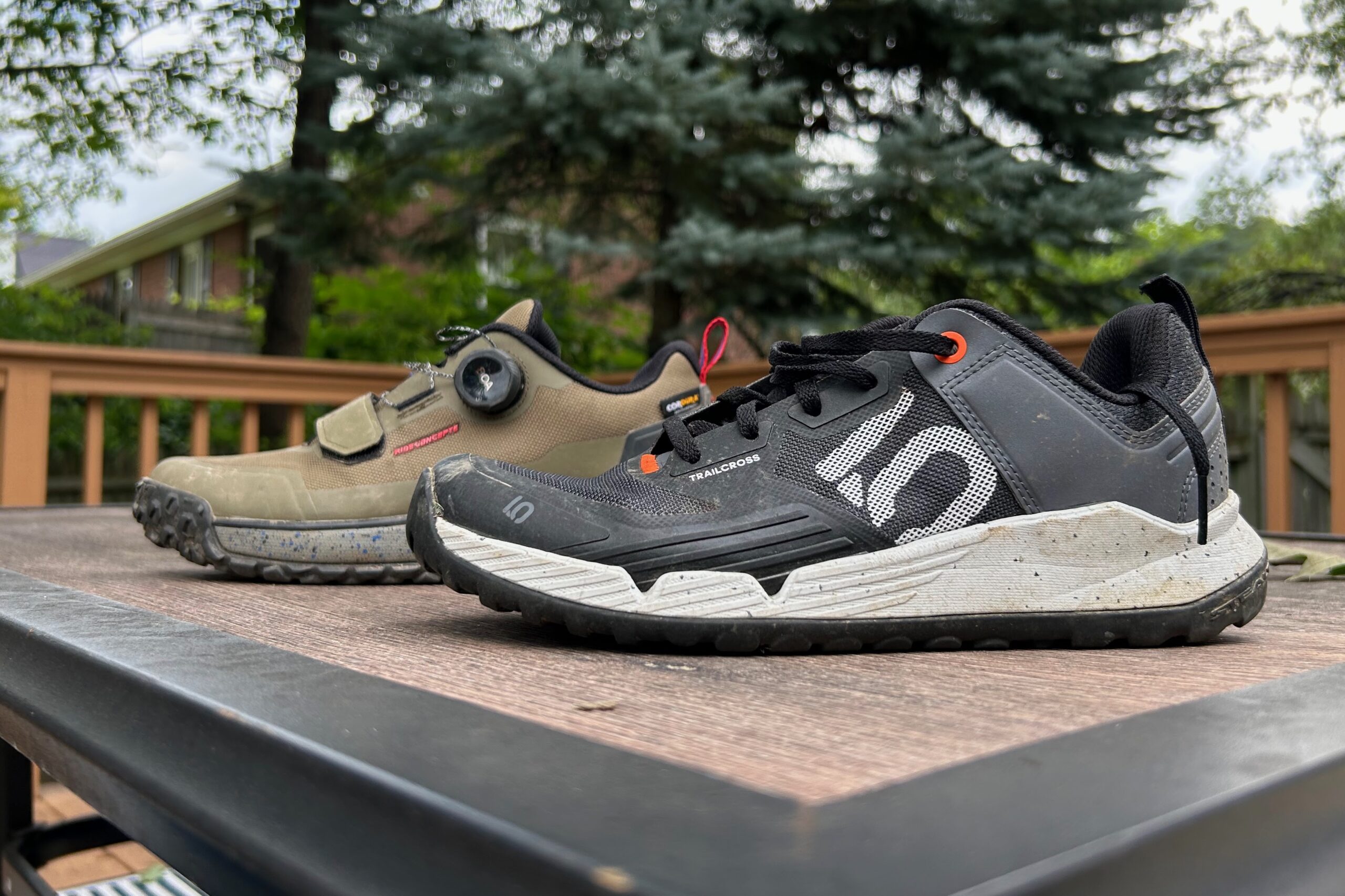
Breathability and Water Resistance
The best flat pedal mountain bike shoes need to handle a wide range of temperatures and conditions, from bone dry to rainy and sopping wet. Your needs, however, will depend on where you live and the conditions you experience on the trails. If you live in a very hot climate, you might compromise on the level of padding and water resistance in favor of a thinner, more breathable upper to let airflow into the shoe.
If you are constantly riding in the rain, you might prefer a less porous upper with water-resistant materials to keep water out, often at the expense of breathability. Most modern shoes handle conditions from dry to light rain just fine, and there are wet weather-specific shoes, like the Five Ten Trailcross GTX or the Shimano GF800 GTX with a GORE-TEX membrane, on the market for those who live and ride in the worst of conditions.
Most of the shoes tested for this buyer’s guide do fairly well across all environmental conditions, but each has its strengths and weaknesses. All-rounders like the Giro Latch or Five Ten Freerider Pro, using microfiber/synthetic uppers, stay reasonably cool and dry but are not ideal for the hottest or wettest rides.
The rubbery uppers on the Fox Union and Crankbrothers Stamp BOA or the leather/textile Specialized 2FO DH Flat resist water surprisingly effectively but trap a little more heat inside the shoe. The Five Ten Trailcross XT’s mesh upper lets air and water right in but dries very quickly. The Cordura upper of the Ride Concepts Tallac BOA proved to be a surprise favorite in this regard, balancing a high degree of water resistance while also having a well-ventilated feel.
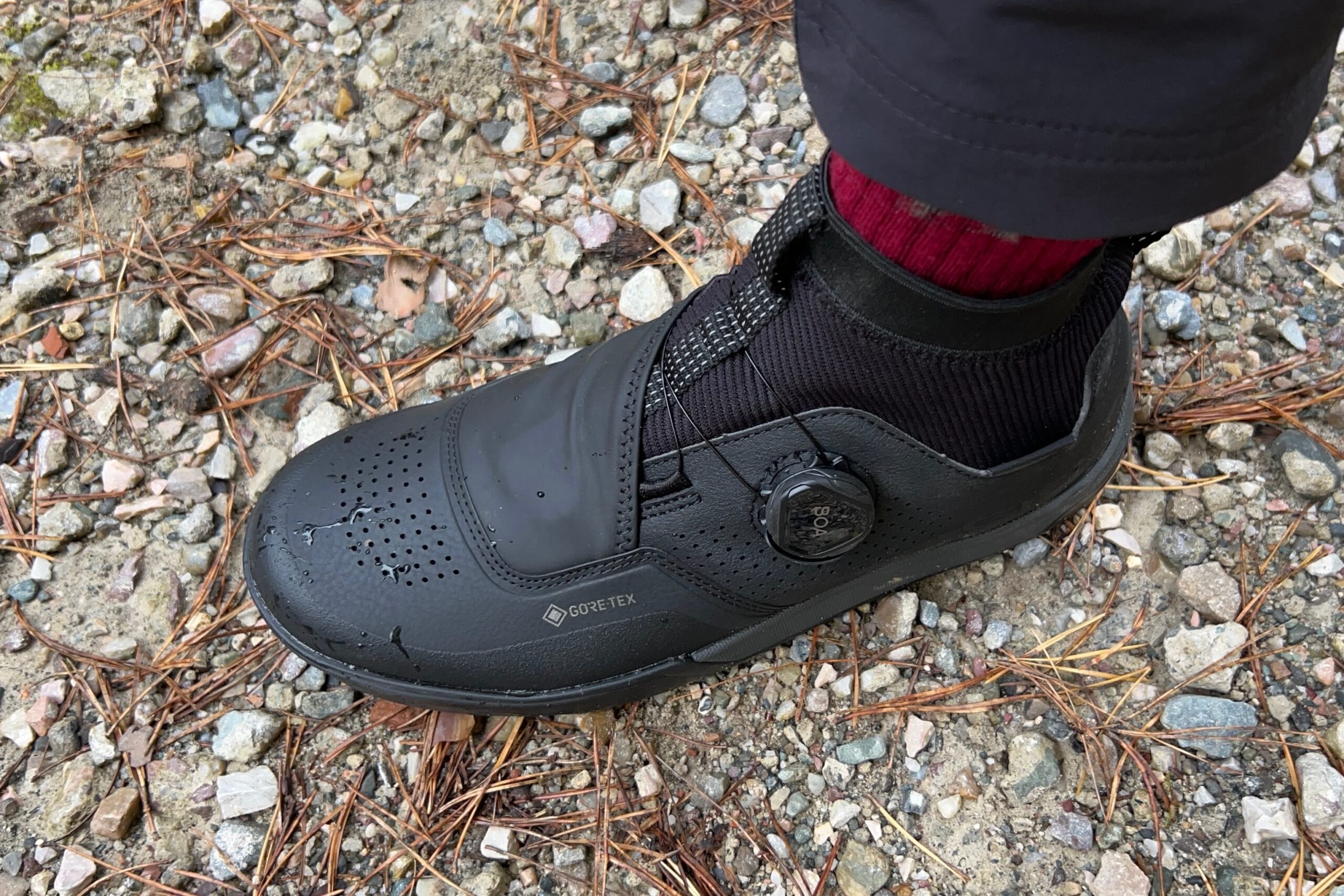
Closures
The majority of flat pedal shoes use traditional shoe laces as the closure system. This is in contrast to the clipless shoe market, where there is a wider range of closure systems. Lately, however, flat pedal shoe brands have been adopting other methods for tightening your flat pedal shoes, including BOA dials.
Some brands and models of shoes are even offered in multiple versions, like the Ride Concepts Tallac that comes with BOA ($200) or laces ($170), and the Crankbrothers Stamp that comes in BOA ($180), Speed Lace ($150), and Lace ($130) versions to suit varying preferences.
Laces certainly work well for the flat pedal shoe application as they pull tension evenly over the mid-foot and they are cheap and easy to replace if they become damaged. The downsides are that they are a little slower to put on and take off, it takes a little longer to adjust tension while riding, and they can be messy to deal with in sloppy conditions.
BOA dials, often used in combination with Velcro straps, are becoming more common on high-end flat pedal shoes. BOA systems use a ratcheting dial to add or remove tension from thin wires/laces over the foot. BOA systems make it very quick and easy to put shoes on and take them off, and to adjust tension while riding.
The downsides are that they typically add to the price of shoes, they can sometimes be damaged, and have a somewhat checkered history in terms of reliability. The good news is that BOA systems are becoming more reliable, and they are often covered by warranty if they break or are damaged.
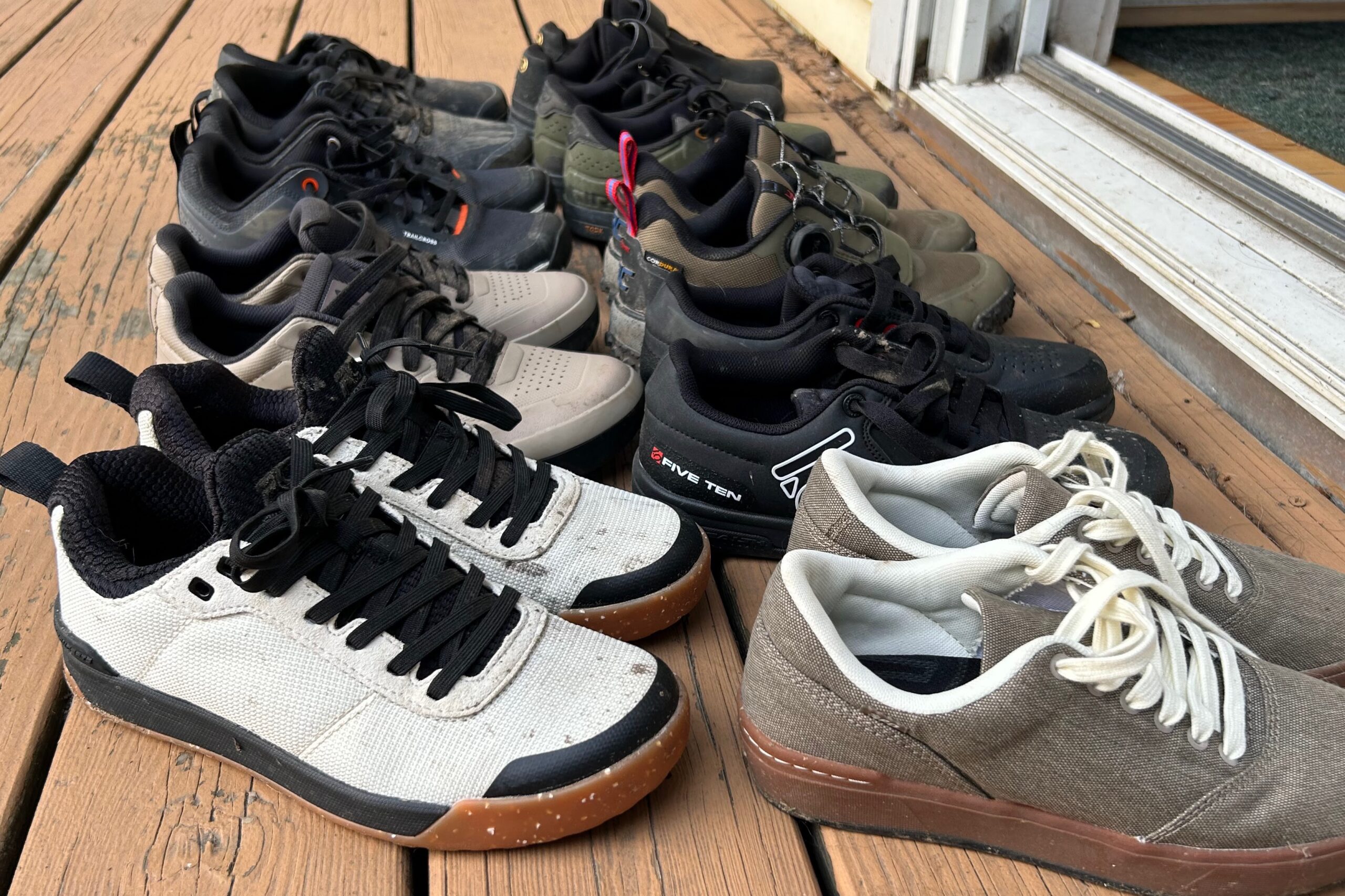
Flat Pedals
As mentioned previously, the flat pedals you choose will also play a major role in the grip, stability, and control equation. There are loads of flat pedal options on the market with different size platforms, profiles, and pin layouts that offer varying levels of grip and performance to meet different needs and preferences. While they may all look relatively similar, they most definitely are not.
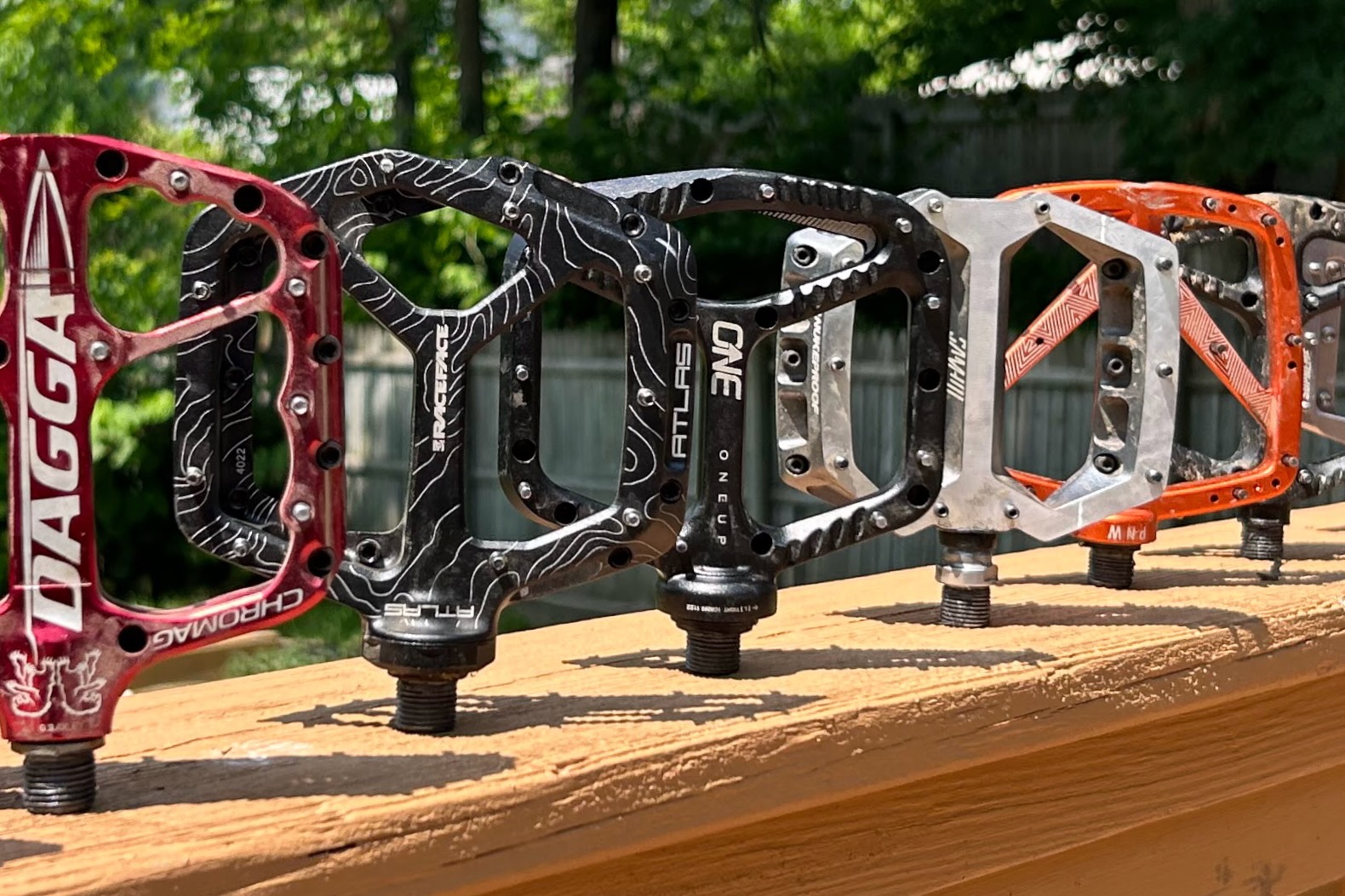
Price & Value
Prices in the flat pedal shoe market don’t vary quite as much as other types of cycling shoes, with prices ranging from $100 to $220 for the models we tested. Generally speaking, flat pedal shoes are a bit simpler than their clipless counterparts, and therefore, you won’t see prices quite as high as premium models for cross-country racing, for example. That said, it’s fair to wonder why some flat pedal shoes cost more than double and whether or not it’s worth spending more.
Budget
If you’re new to the sport or operating on a tighter budget, fear not, there are good shoes at affordable prices. To get a quality pair of flat pedal mountain bike shoes, around $100 is about the least you’re probably going to want to spend. While there aren’t a lot of options below the $150 mark, we think the three models we include in this guide are all solid options. At the lower end of the price spectrum, most shoes you’ll find are generalists for more casual or recreational riders, with quite a few affordable options catering more toward riding the pump track or sessioning dirt jumps.
Of the models we tested, we think the Ride Concepts Livewire ($110) represents the best value you’ll find. These shoes are a capable all-arounder that’s stiff enough to still be relatively efficient, grippy on the pedals, and can handle everything from pedal-heavy trail rides to light duty at the bike park. Ride Concepts keeps the price low by using traditional laces and a synthetic canvas upper, which sacrifices a little in terms of weather resistance and potential durability compared to more advanced materials.
Similarly, the Specialized 2FO Method ($100) blends a super grippy outsole, casual-looking canvas uppers, and a relatively soft sole to create a shoe that’s great for the pump track or more casual trail rides. Neither option will blow you away with its performance, but both work well for their intended application.
Mid-Tier
The middle of the price spectrum, at or around $150, is where the majority of riders will likely find the best price-to-performance ratio. In this price range, most shoes will employ traditional lace closures, but they typically use more advanced and durable synthetic leather uppers and often have stiffer soles and increased foot protection. While most mid-range shoes are all-arounders, we begin to see some specialization for specific riding styles.
The top-rated Giro Latch ($150) and the uber-popular Five Ten Freerider Pro ($160) are perfect examples. These shoes are nearly identical on paper, looks, and on-bike performance, and they will suit the needs of most riders perfectly.
With soles that are fairly stiff for pedaling efficiency and support, grippy rubber soles for reliable pedal grip, and supportive, durable synthetic uppers, these shoes are well-rounded performers that work well for most types of riding. There’s a good reason they are so popular. They simply work well and don’t cost an arm and a leg.
While some brands charge a premium for BOA lacing, Five Ten’s new Freerider Pro BOA ($170) costs only $10 more than the lace-up version. It performs nearly identically, otherwise, so now you can choose to dial in your fit for less than the competition.
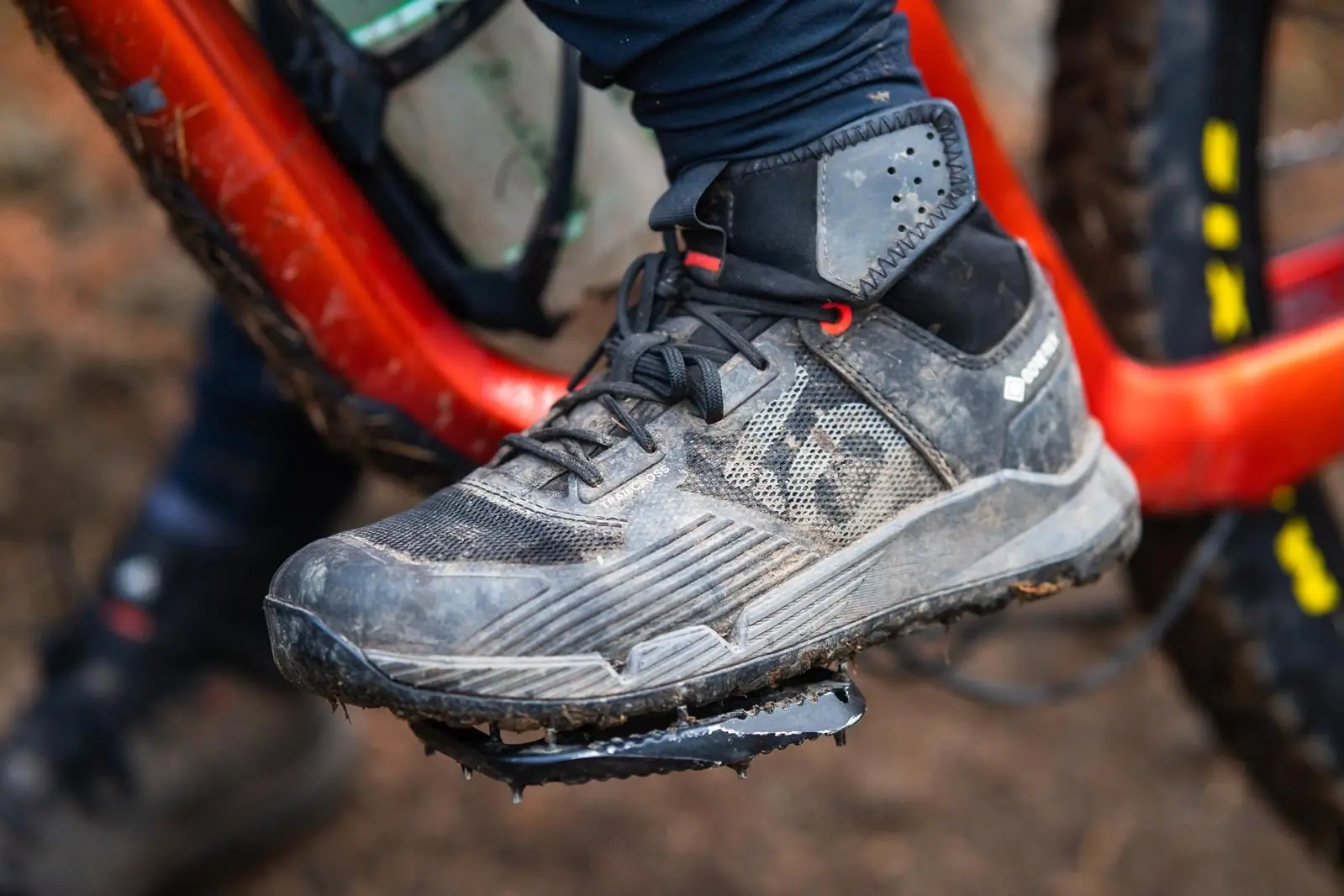
Premium
As we climb closer to and above the $200 mark, we enter the high-end of the flat pedal shoe market. With the increase in price, we start to see more niche products, materials, and/or features that drive the price up. These include fancier closure systems like BOA dials or the addition of membranes like GORE-TEX to keep the elements at bay. Often, shoes at the upper end of the price range are simply upgraded versions of mid-tier models, just a little fancier.
Both of the foul-weather shoes we tested, the Shimano GF800 GTX ($220) and the Five Ten Trailcross GTX ($220), are made with GORE-TEX membranes. These shoes are intended for use in the wet, cold, or both, and riders can pay more for the comfort of keeping their feet dry when the elements are conspiring against them. Others, like the Ride Concepts Tallac BOA ($200) or the Crankbrothers Stamp BOA ($180), simply cost more than their lace-up counterparts because of the BOA closure system.
Frequently Asked Questions
Yes, of course, you can mountain bike in any old shoes you choose but we recommend using shoes that are made for the job. Flat pedal specific mountain bike shoes are optimized for traction, support, safety, and to handle the environmental conditions you’ll encounter on the trail. While preferences and opinions vary, we feel that the performance benefits, particularly pedal grip, support, vibration absorption, and foot protection, make using flat pedal mountain bike shoes the best choice.
Yes! Flat pedals vary in terms of platform size, pin layout, etc, and they provide varying levels of support and grip. Generally speaking, most good pedals will work well with most good shoes, but you’ll also need to consider your riding style and needs/wants from a pedal as they do perform differently. During testing, we used most of the shoes with the Nukeproof Horizon Pro Sam Hill Enduro pedal for consistency, with the Chromag Dagga and Raceface Atlas sprinkled in.
The sole patterns on most shoes in this test are optimized to work with a wide variety of pedals, with the exception of the Crankbrothers Stamp BOA, which is designed specifically to work with their Stamp pedal line. This is done by matching the tread pattern to the silhouette and pins of the pedals. The Stamp shoes work well enough with most pedals, but we found they actually work slightly better on the Stamp pedals as the pins fit into the grooves in the sole tread.
Platform size is also a consideration, as some come in different sizes that are optimized to work with different size feet. Riders with smaller feet may opt for pedals with smaller platforms to better match the sole of their shoes, while those with larger feet will typically gravitate towards larger platforms for added stability.
The sizing of a shoe is very unique to the shape and size of your foot and proper fit is very important. Too small of a shoe and you may end up with pinched toes, cramping, and discomfort, too loose and your foot may end up slipping around inside the shoe which can cause blisters and result in a reduction of control.
Fit preferences vary, of course, but most people generally can start at or near their everyday shoe size and go from there. Given that our shoes are a contact point for control of our mountain bikes, however, many people will opt for a snug fit that is achieved by sizing down slightly from their regular street shoe size. And, of course, sizing is not perfectly consistent across different brands, so it is generally best to try shoes on before you buy to ensure they fit you correctly.
The lifespan of a pair of mountain bike shoes is directly related to how much you ride and the level of abuse you put them through. People who ride almost every day all season long may only get a season of use out of a pair of shoes, while those who ride less frequently or more casually should expect to get a couple of seasons or more from a quality pair.
Typically, the soft rubber of the soles is one of the first places to show wear, as the pedal pins leave marks, grooves, and scars in the rubber. Similarly, the uppers of shoes may be prone to damage if scraped on rocks, logs, and shrubbery and may break down slightly more quickly when used in wet conditions frequently.
Given the duration of our test period, we can’t comment definitively on the long-term durability of any of the shoes we tested. After a couple of months of riding, they all showed minimal wear, and we expect most models in this test to be reasonably durable given their intended use.
The beefier models like the Ride Concepts Tallac BOA and Specialized 2FO DH Flat seem the most rugged and capable of handling the most abuse, while models like the Five Ten Trailcross XT and Specialized Method could be prone to wearing out faster, given the lighter materials used in their uppers.
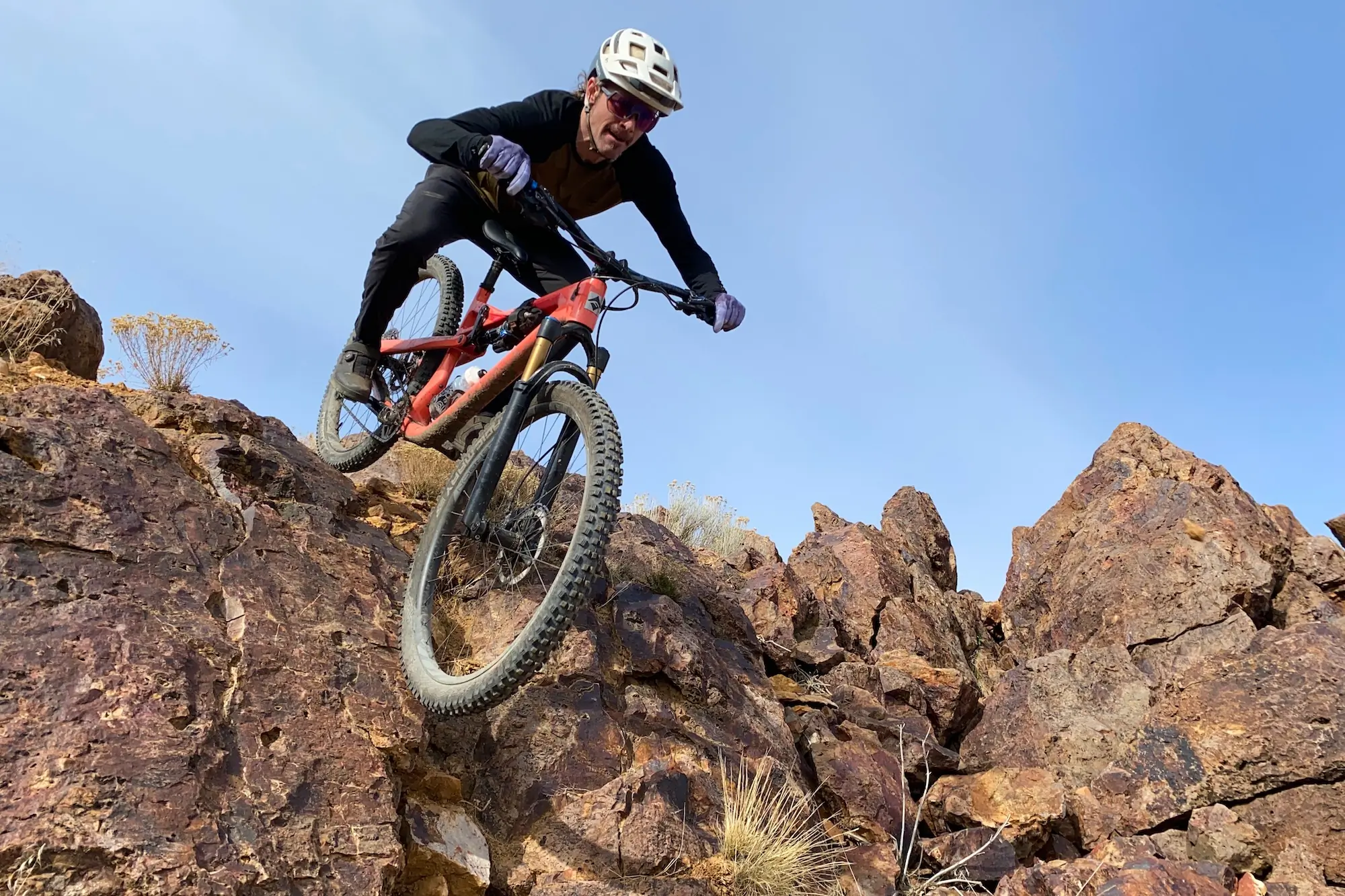

The Best Mountain Bike Helmets of 2025
We tested the top models from Giro, Specialized, POC, Smith, and more to help you find the best mountain bike helmet for your next ride.
